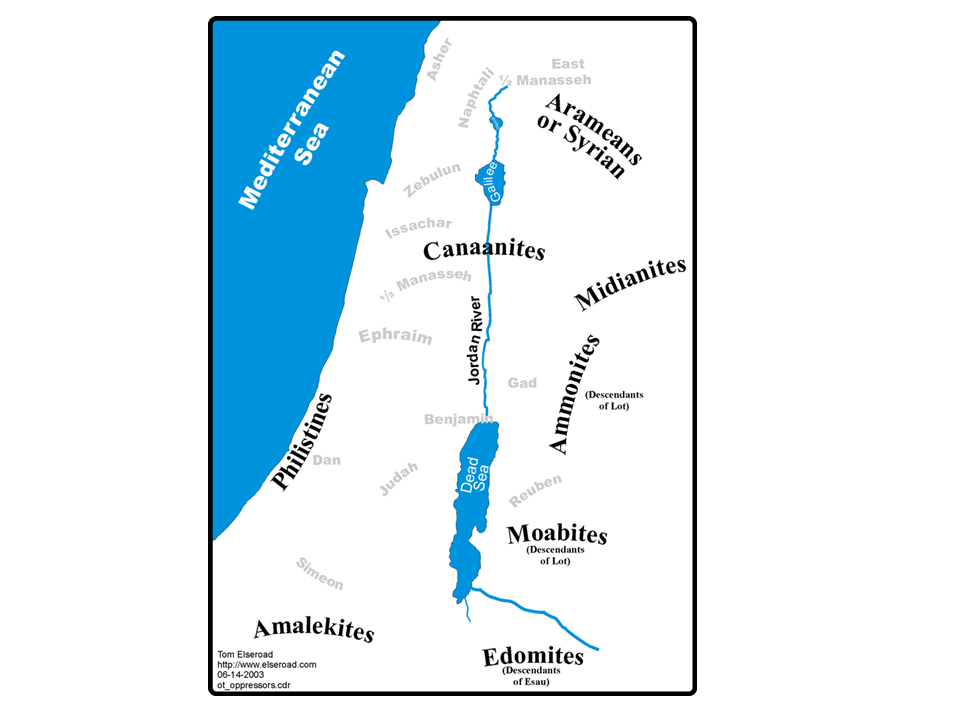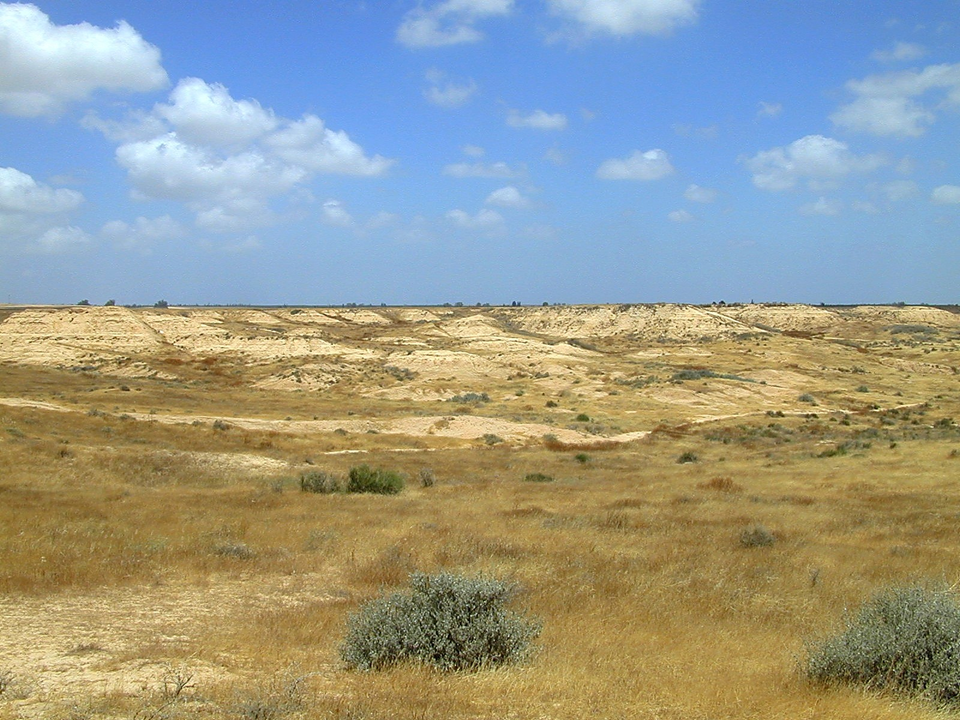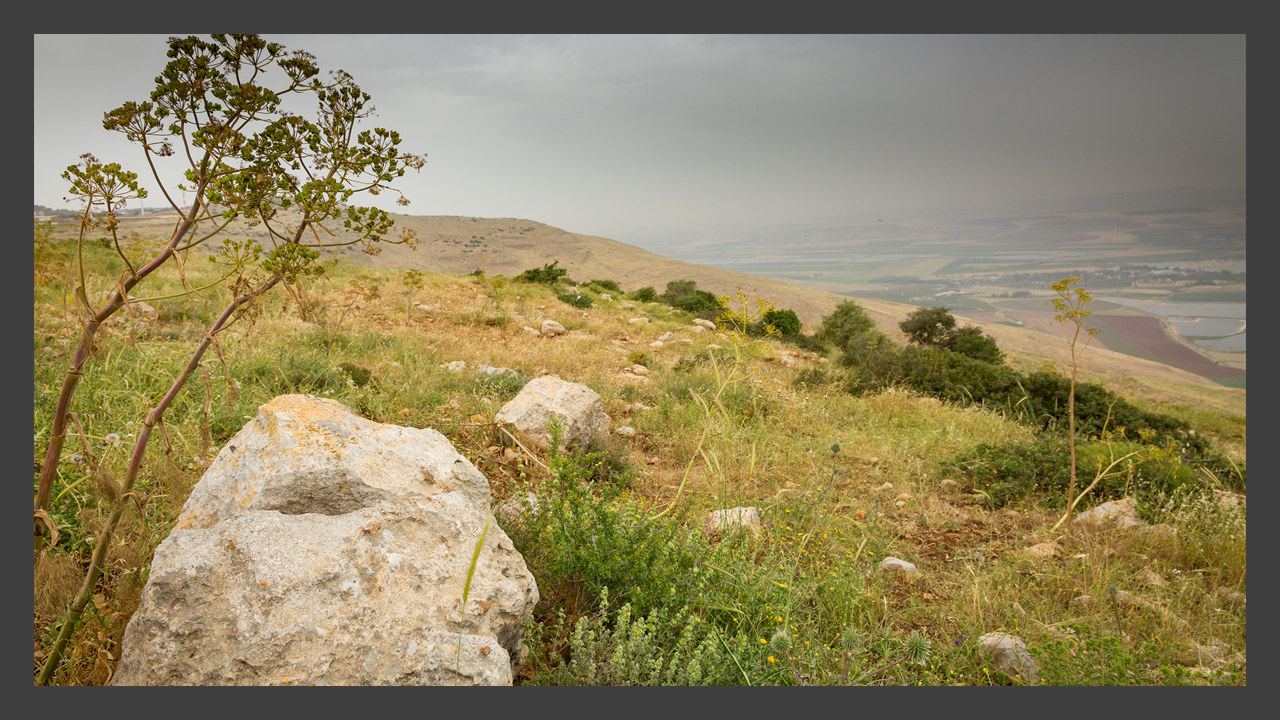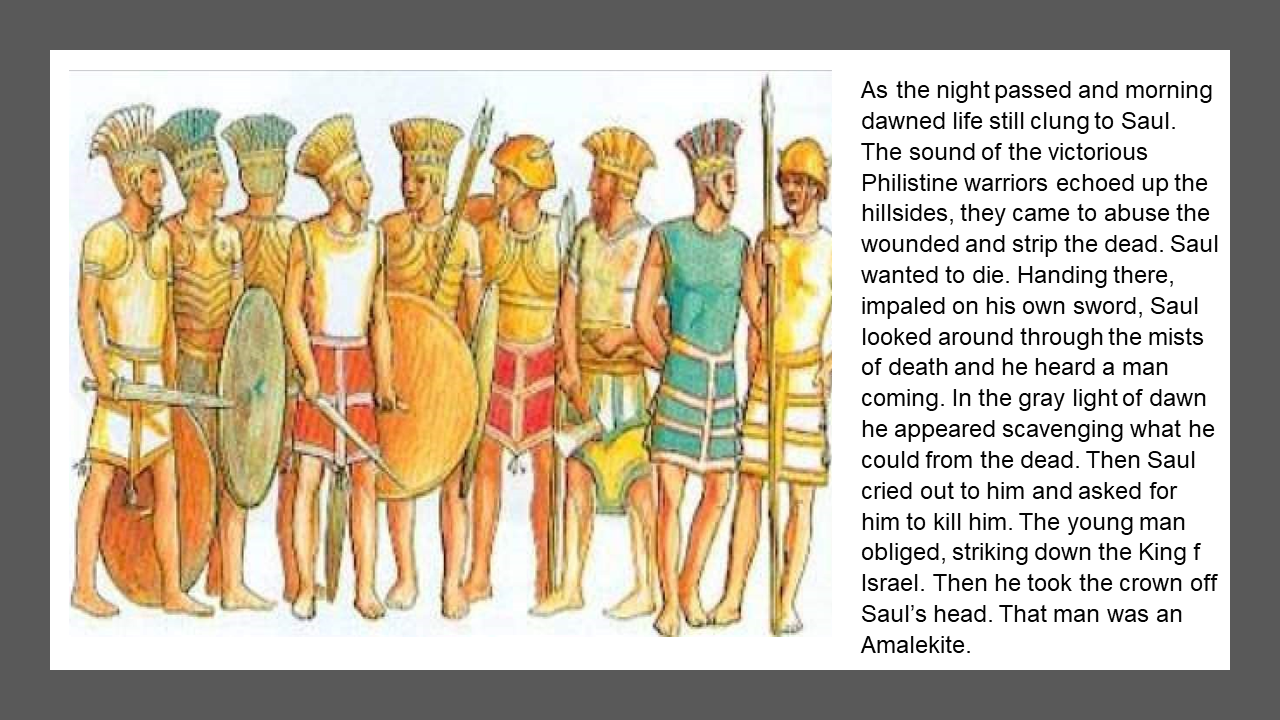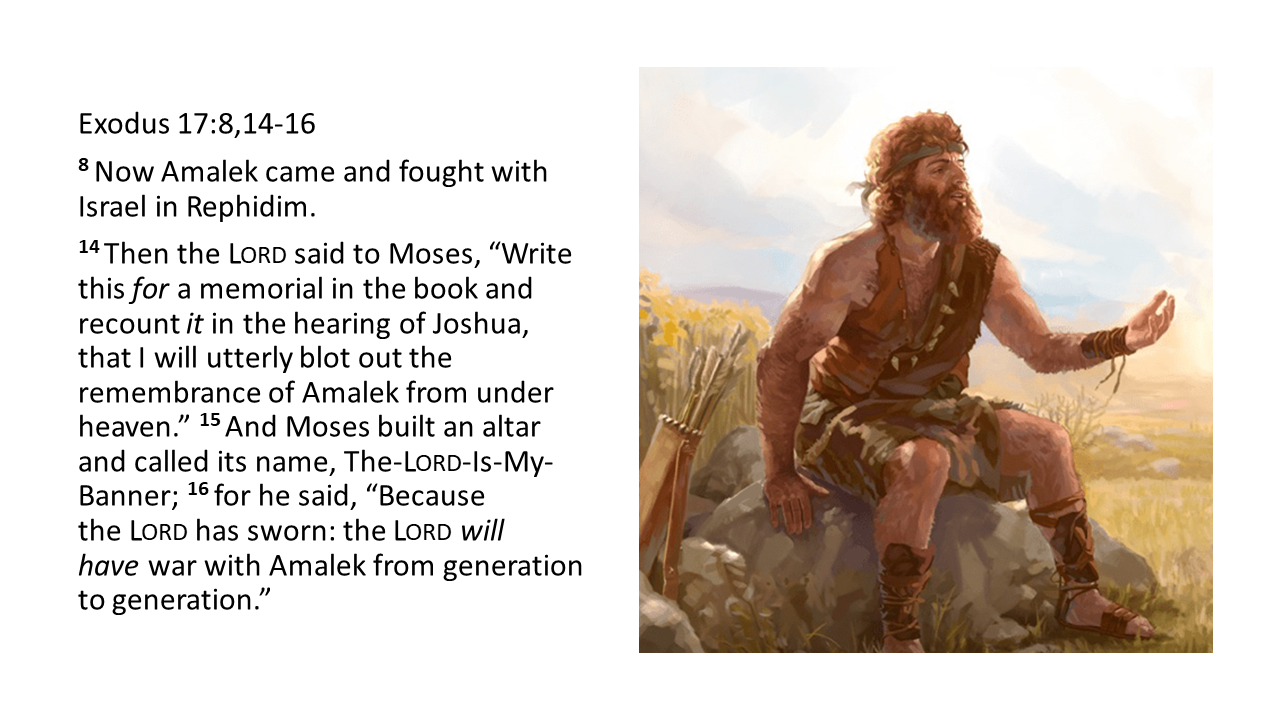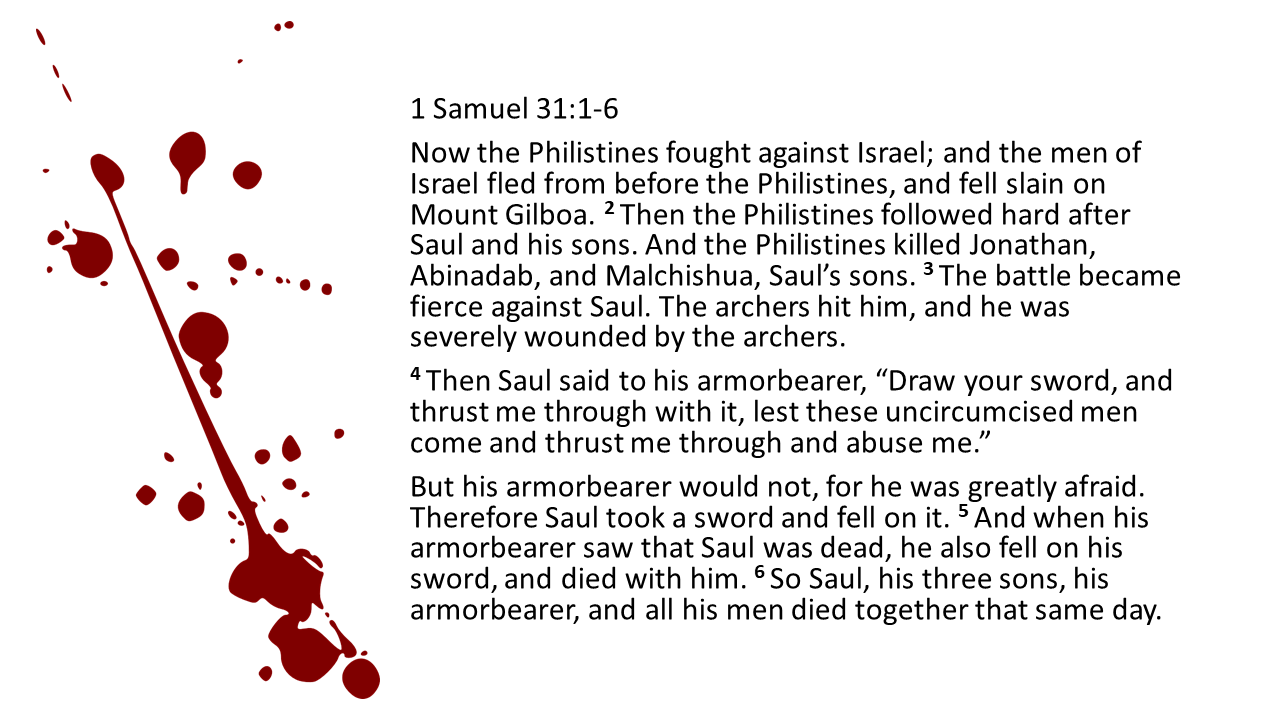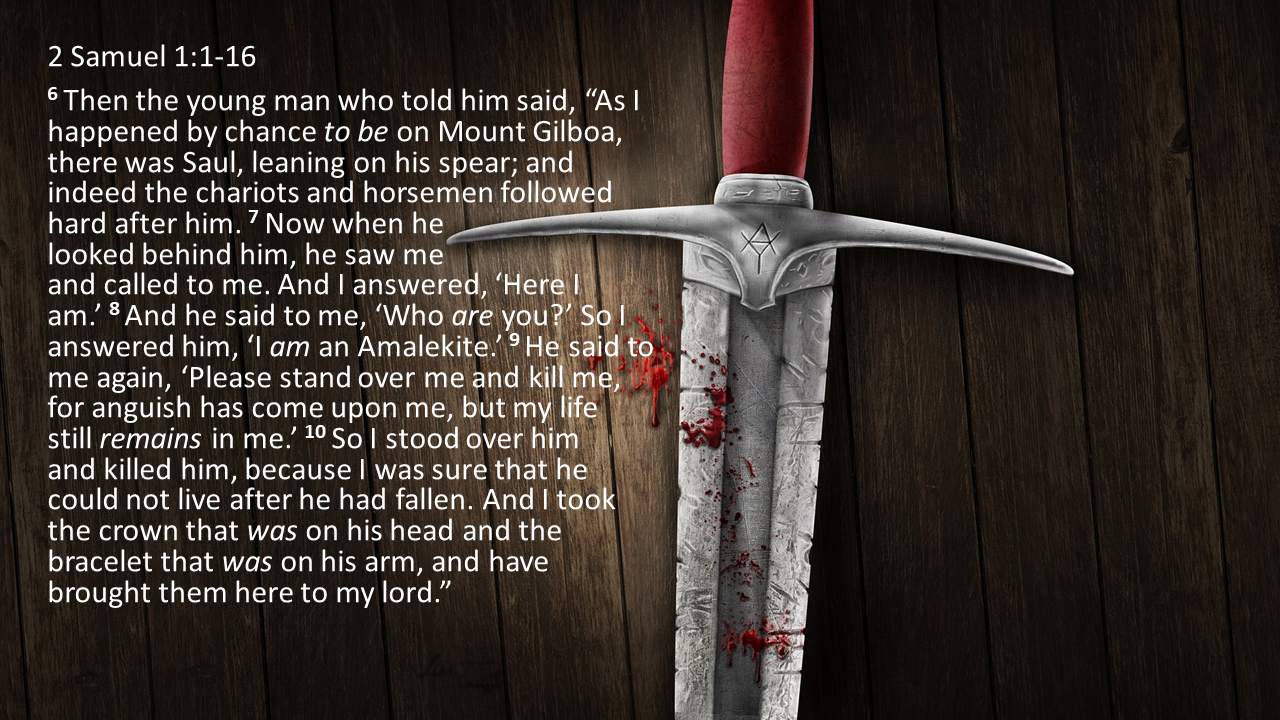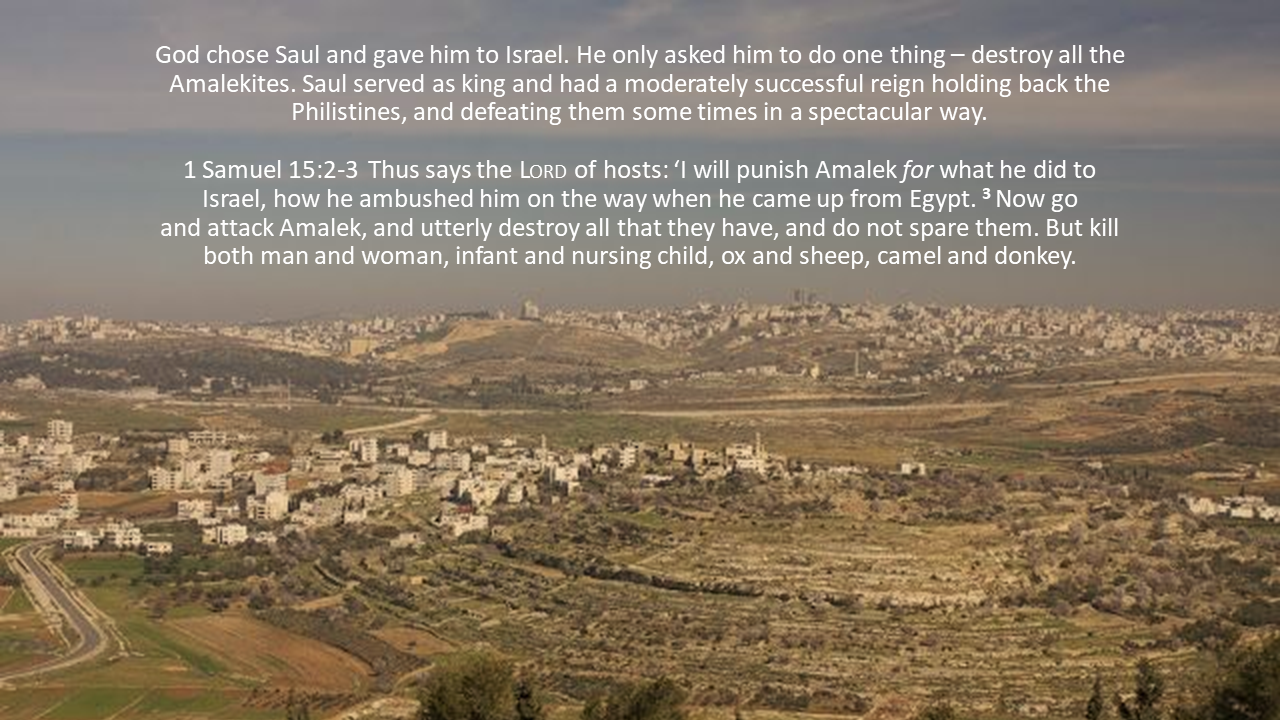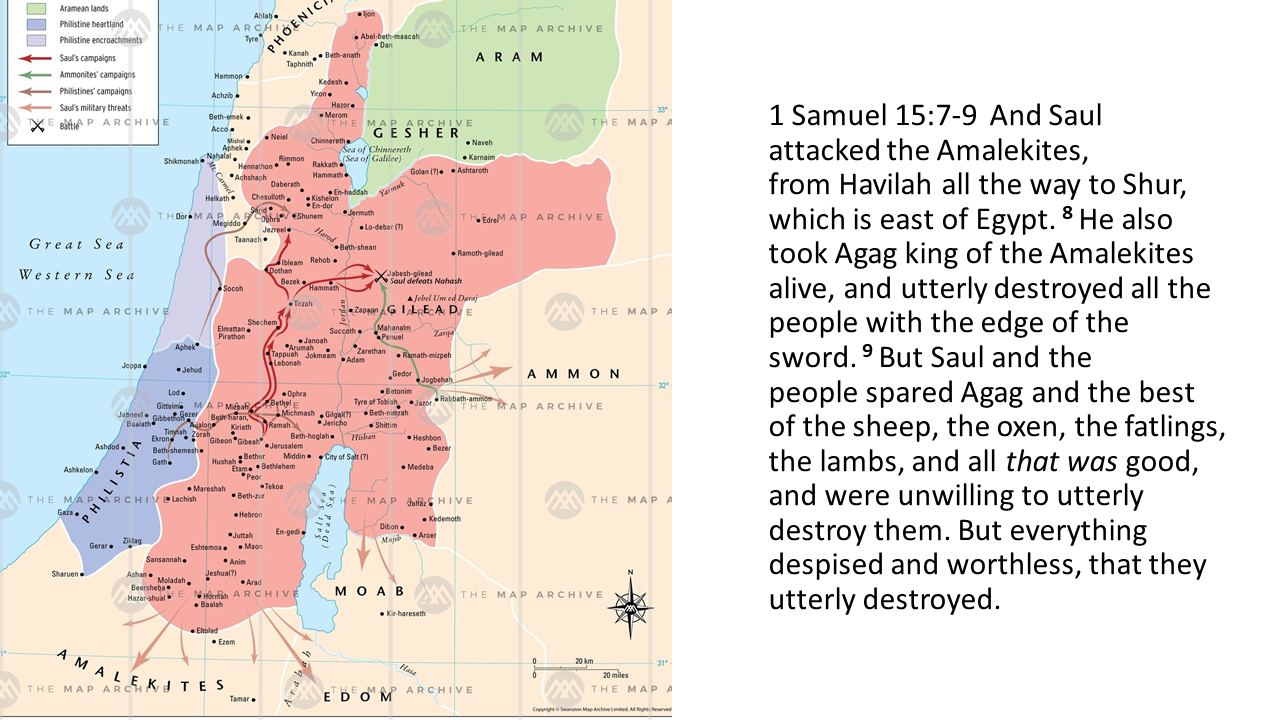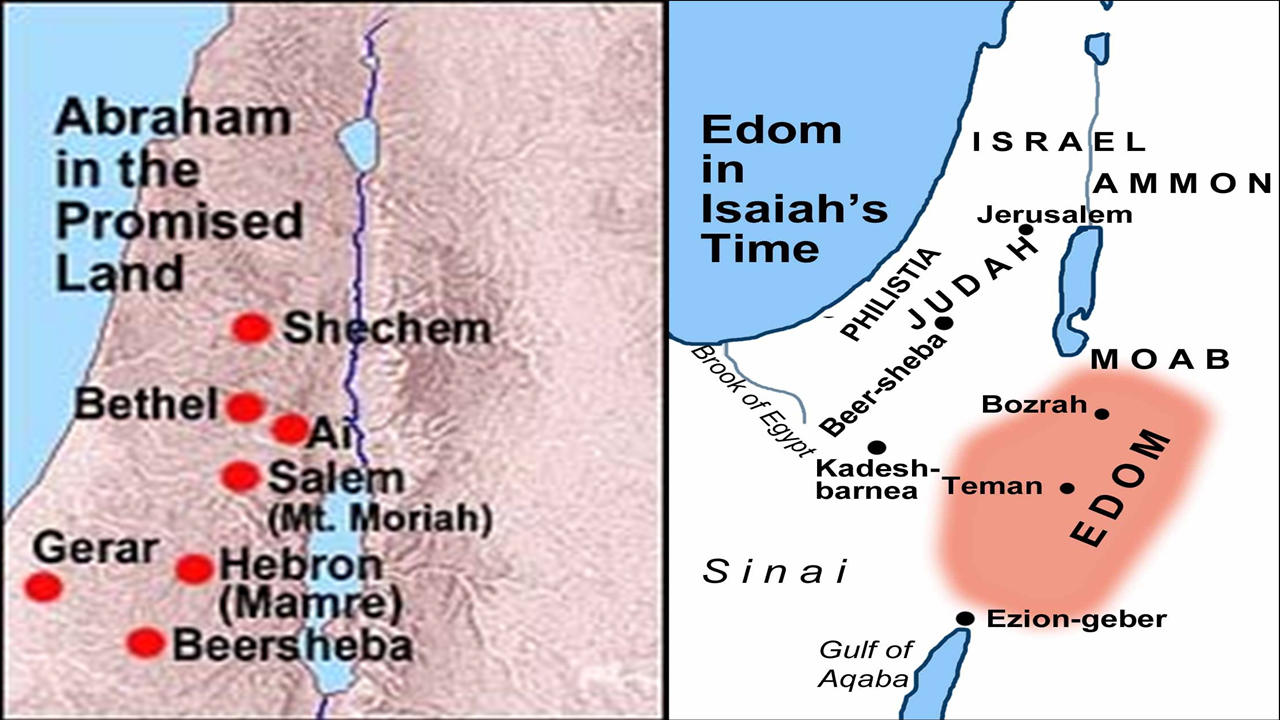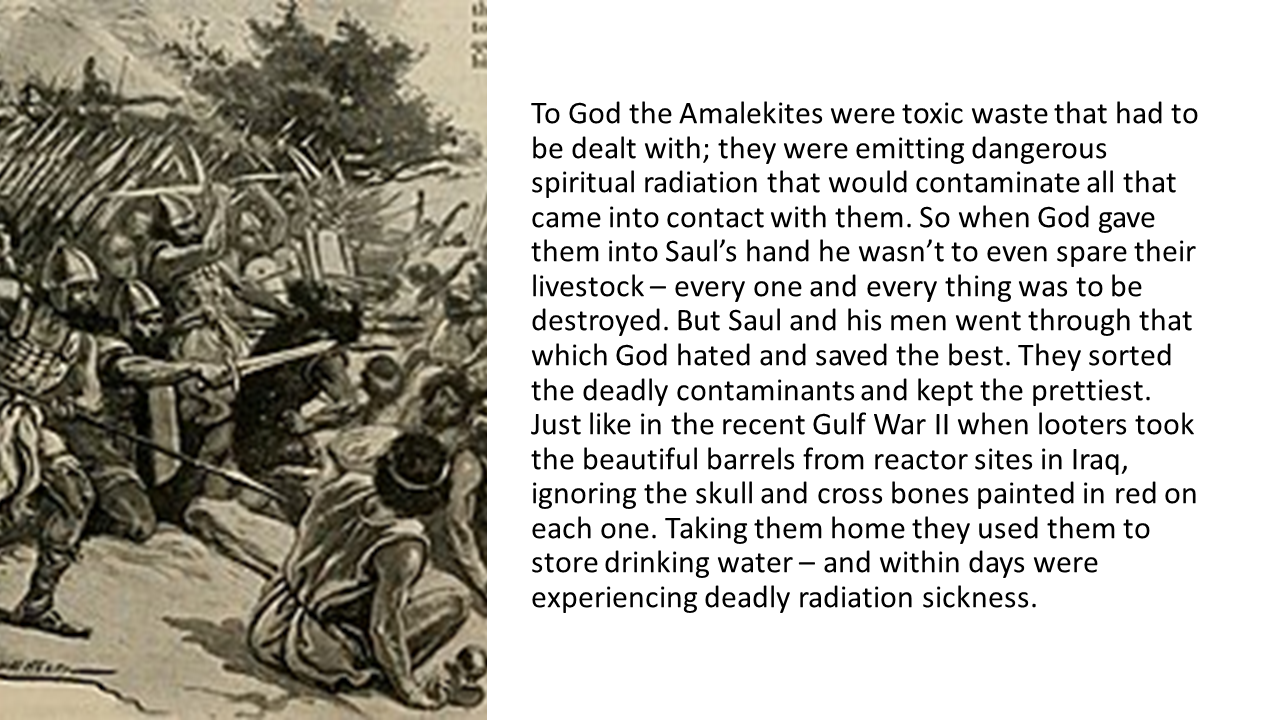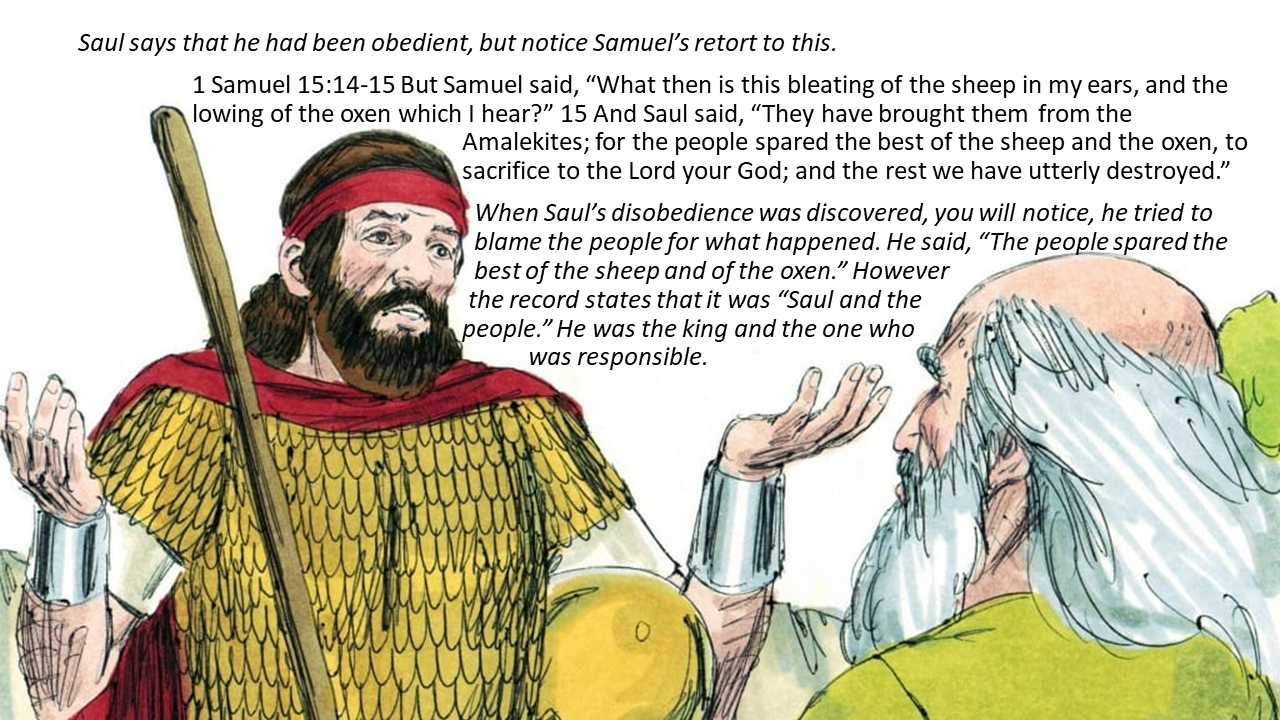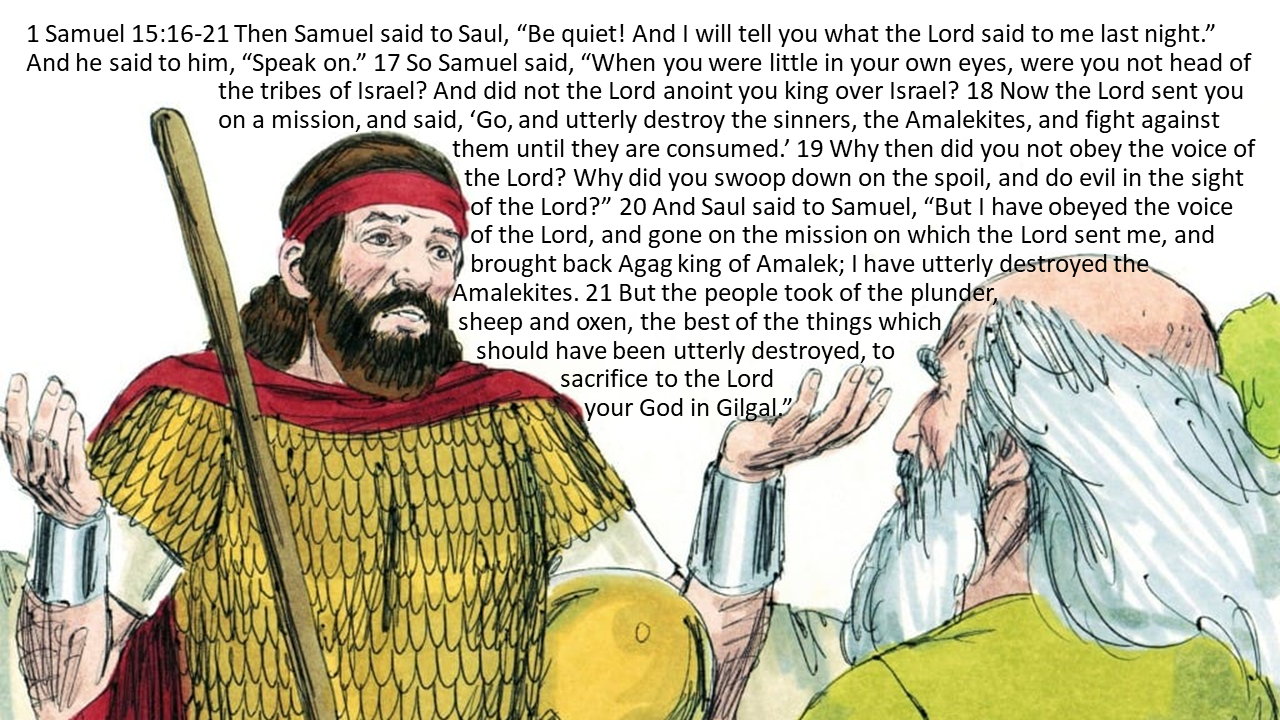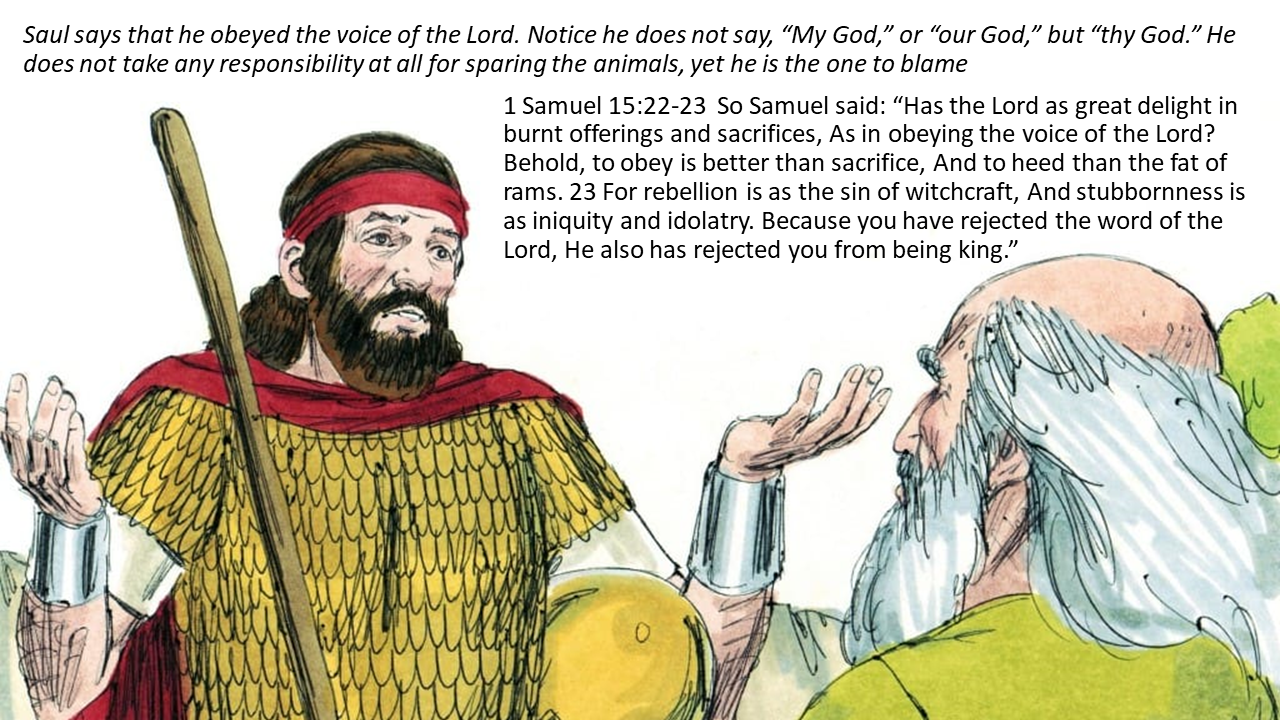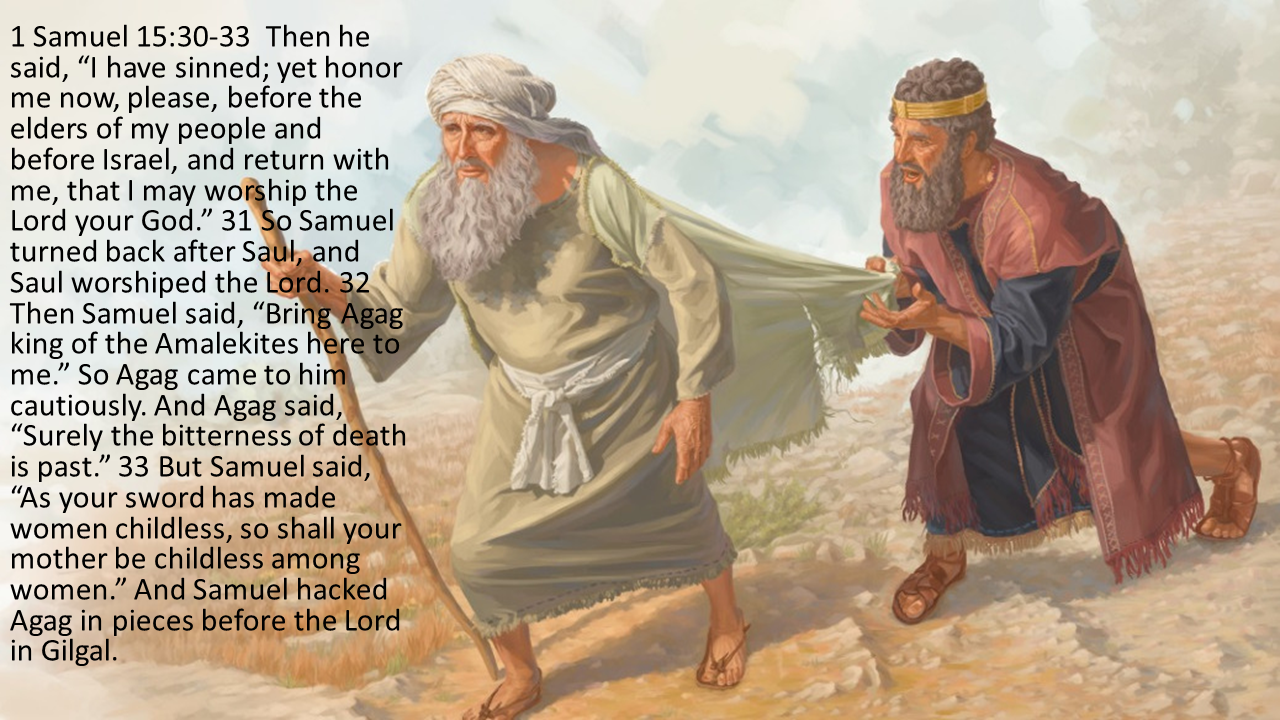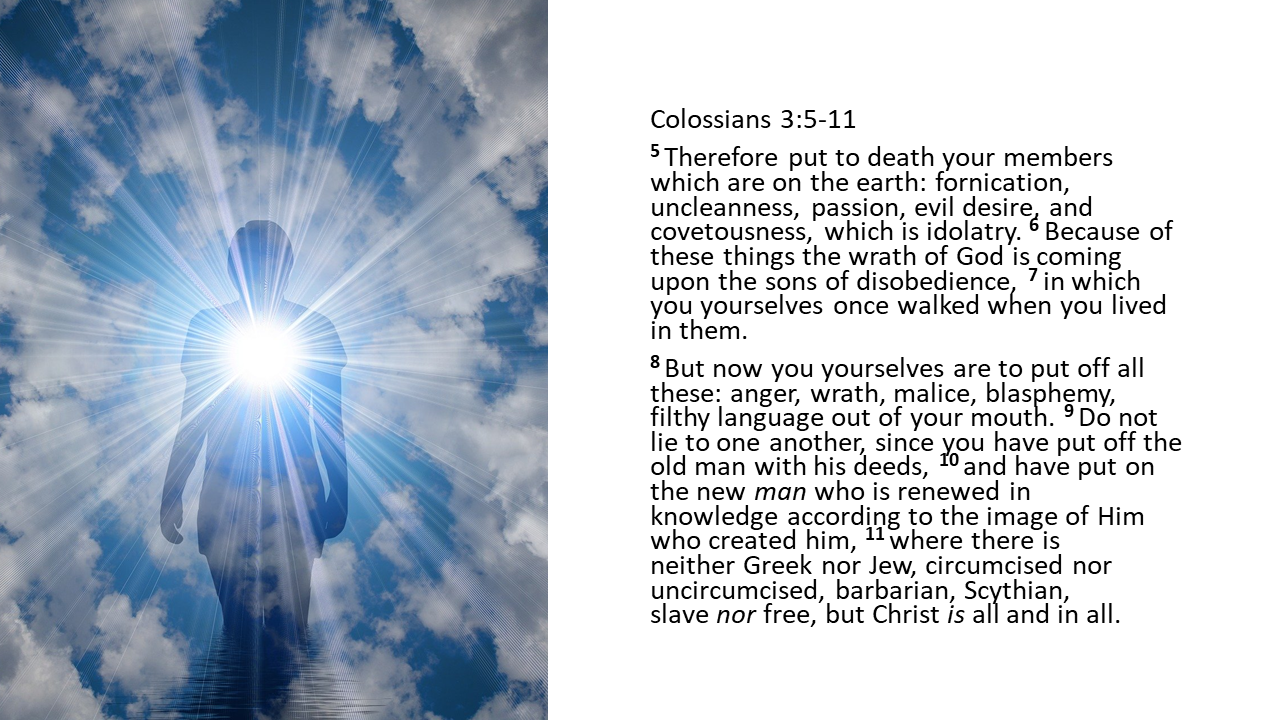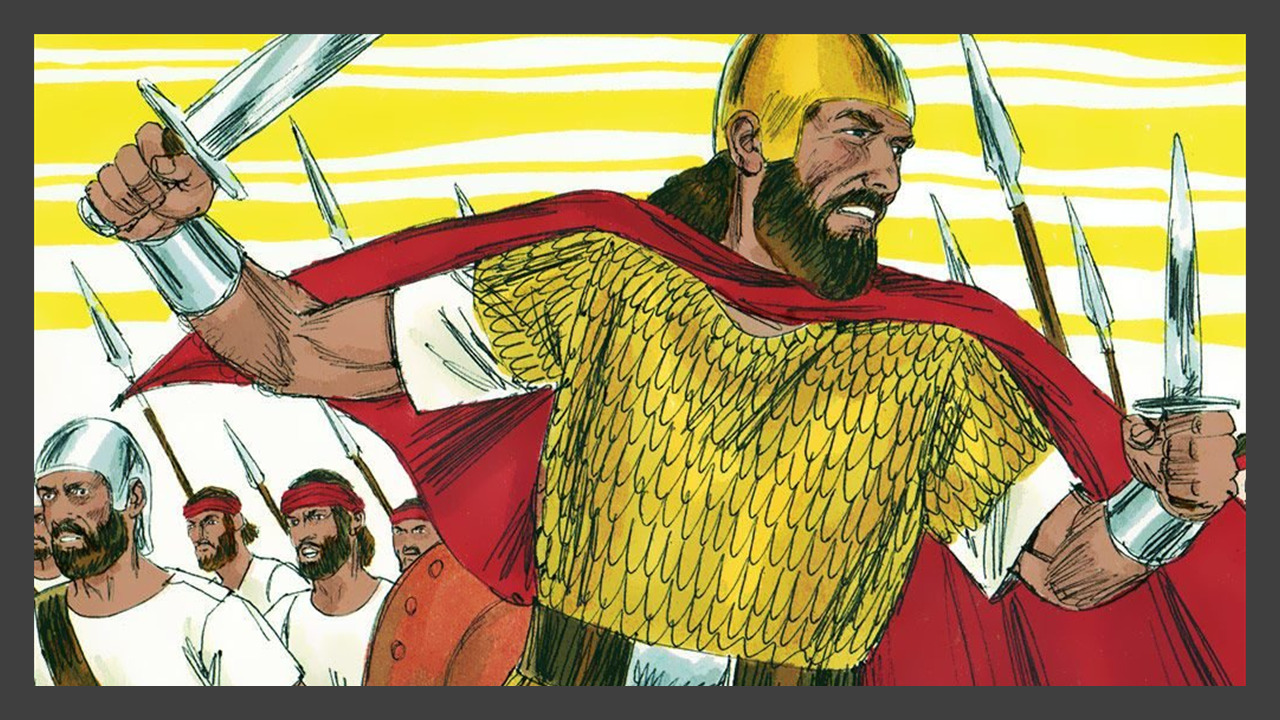031019PM
BIO-13 NR2-32 WTB-03
THE WORLD OF THE BIBLE:
ABRAHAM, AMALEK & AGAG
 On this windswept hill, three thousand years ago the mightiest man of Israel fell wounded; King Saul with life agonizingly clinging within his tortured body — called out to a passing man and had him end his earthly suffering. That man killed King Saul and took his crown. That man was an Amalekite.
On this windswept hill, three thousand years ago the mightiest man of Israel fell wounded; King Saul with life agonizingly clinging within his tortured body — called out to a passing man and had him end his earthly suffering. That man killed King Saul and took his crown. That man was an Amalekite.
After the fierce battle all day with the Philistines — arrows from the enemies he had fought gravely wounded King Saul. His sons and heirs to the throne lay dead around him, night was falling, the enemies had retreated – and Saul was alone.
The mightiest man of Israel, head and shoulders taller than anyone else now dragged himself along trying to reach his sword fallen on the battlefield. When he had it at last he pushed himself upon it to end his dreadful pain.
As the night passed and morning dawned life still clung to Saul. The sound of the victorious Philistine warriors echoed up the hillsides, they came to abuse the wounded and strip the dead. Saul wanted to die. Handing there, impaled on his own sword, Saul looked around through the mists of death and he heard a man coming. In the gray light of dawn he appeared scavenging what he could from the dead. Then Saul cried out to him and asked for him to kill him. The young man obliged, striking down the King f Israel. Then he took the crown off Saul’s head. That man was an Amalekite.
Listen, this is the message I want to underline in your heart and mind.
- Any part of your old life that you spare will come back and slay you and take your crown.
- Any part of our flesh (like Agag) that we spare will come back with a vengeance and slay us.
- Amalekites (the flesh) always come to strike us down when we are weakest – and then rob us of our crown.
And so what? Why does God always leave those little details lying around? Turn there with me to 1st Samuel 31.1-6; and then 2nd Samuel 1.1-16.
God chose Saul and gave him to Israel. He only asked him to do one thing – destroy all the Amalekites. Saul served as king and had a moderately successful reign holding back the Philistines, and defeating them some times in a spectacular way.
Finally the Lord gave the Amalekites into his hand. He severely routed them and could have finished them off once and for all. But he didn’t. He spared their king named Agag and the best of the plunder. Look there with me in 1st Samuel 15.2-3.
Saul kept only the best – of what God hated. To God the Amalekites were toxic waste that had to be dealt with; they were emitting dangerous spiritual radiation that would contaminate all that came into contact with them. So when God gave them into Saul’s hand he wasn’t to even spare their livestock – every one and every thing was to be destroyed. But Saul and his men went through that which God hated and saved the best. They sorted the deadly contaminants and kept the prettiest. Just like in the recent Gulf War II when looters took the beautiful barrels from reactor sites in Iraq, ignoring the skull and cross bones painted in red on each one. Taking them home they used them to store drinking water – and within days were experiencing deadly radiation sickness.
God wanted to utterly destroy this nation and its ferocious, plundering, merciless culture of murder and wickedness. The Amalekites were the 1st nation to attack Israel when they came out of Egypt. They struck the rear and murdered the weak and frail and old who brought up the end of the line. They did so with desire – they preyed upon the helpless and God exposed them for what they were.
The grandson of Esau — the grandson of Abraham, fathered the Amalekites.
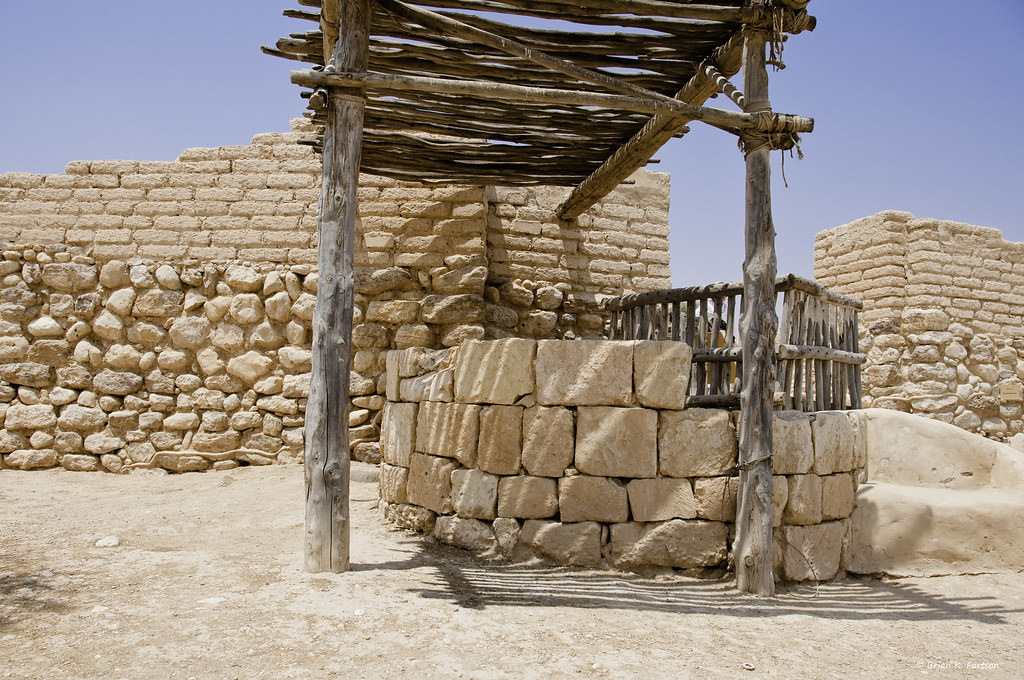 Quick history lesson: Abraham was from the 22nd century before Jesus, his son Isaac was from the 21st century BC. Esau was the 1st born of Isaac in the 20th century BC, and as we all know from the stories we learned growing up – he despised his inheritance. What we don’t catch is – it wasn’t the wealth, the herds, the crops, and the Land that he despised or loathed or didn’t want…it was the BLESSING. Esau as Hebrews 12 tells us was a profane man, an immoral man, and a man who would not and could not repent of his sin. He was proud and wicked and hated the God of his fathers. He was born 2006 BC in Beersheba.
Quick history lesson: Abraham was from the 22nd century before Jesus, his son Isaac was from the 21st century BC. Esau was the 1st born of Isaac in the 20th century BC, and as we all know from the stories we learned growing up – he despised his inheritance. What we don’t catch is – it wasn’t the wealth, the herds, the crops, and the Land that he despised or loathed or didn’t want…it was the BLESSING. Esau as Hebrews 12 tells us was a profane man, an immoral man, and a man who would not and could not repent of his sin. He was proud and wicked and hated the God of his fathers. He was born 2006 BC in Beersheba.
Genesis 36.12 tells us that the 1st born son of Esau had his first son and his name was Amalek. So over 500 years has passed from the birth of these nations[1]. In an unusual way as the Lord instructed Moses in the battle and the aftermath we see that something big is going on here. God only let Israel win when Moses’ hands were raised, and after the battle the Lord calls Himself Yahweh-Nissi and says He will fight Amalek from generation to generation.
What is going on? Basically this. Esau despised the blessing. Esau was proud and self-sufficient, profane and immoral. Esau represents the flesh. His grandson Amalek becomes the Biblical illustration of the flesh and the life long battle each of us will have with our flesh.
Now back to the tragic end of Saul on Mount Gilboa. Why did that happen? In 1st Samuel 15.
1 Samuel 15:1-3 1 Samuel also said to Saul, “The Lord sent me to anoint you king over His people, over Israel. Now therefore, heed the voice of the words of the Lord. 2 Thus says the Lord of hosts: ‘I will punish Amalek for what he did to Israel, how he ambushed him on the way when he came up from Egypt. 3 Now go and attack Amalek, and utterly destroy all that they have, and do not spare them. But kill both man and woman, infant and nursing child, ox and sheep, camel and donkey.’ ”
These instructions may seem extreme to you if you are not familiar with the history of Amalek. Moses, who was there when it happened, rehearsed the episode for the younger generation in Deuteronomy 25:17–19: “Remember what Amalek did unto thee by the way, when ye were come forth out of Egypt; How he met thee by the way, and smote the hindmost of thee, even all that were feeble behind thee, when thou wast faint and weary; and he feared not God. Therefore it shall be, when the Lord thy God hath given thee rest from all thine enemies round about, in the land which the Lord thy God giveth thee for an inheritance to possess it, that thou shalt blot out the remembrance of Amalek from under heaven; thou shalt not forget it.”
I Samuel 15:4-7 So Saul gathered the people together and numbered them in Telaim, two hundred thousand foot soldiers and ten thousand men of Judah. 5 And Saul came to a city of Amalek, and lay in wait in the valley. 6 Then Saul said to the Kenites, “Go, depart, get down from among the Amalekites, lest I destroy you with them. For you showed kindness to all the children of Israel when they came up out of Egypt.” So the Kenites departed from among the Amalekites. 7 And Saul attacked the Amalekites, from Havilah all the way to Shur, which is east of Egypt.
Now up to this point Saul is being obedient.
1 Samuel 15:8-9 He also took Agag king of the Amalekites alive, and utterly destroyed all the people with the edge of the sword. 9 But Saul and the people spared Agag and the best of the sheep, the oxen, the fatlings, the lambs, and all that was good, and were unwilling to utterly destroy them. But everything despised and worthless, that they utterly destroyed.
He thought, what a shame to destroy everything! So he saved Agag, who was the ruler of the Amalekites. Saul had no right to spare him any more than he had the right to spare the humblest peasant among these people. This nation was wholly given to evil, and the king, above all others, should have been destroyed and judged at this time. Neither had Saul the right to save from destruction the best of the cattle. It would appear that he made his attack for the purpose of obtaining booty and spoil, and God had forbidden that. The Israelites were bringing judgment upon the Amalekites for Almighty God in this particular case.
1 Samuel 15:10-13 Now the word of the Lord came to Samuel, saying, 11 “I greatly regret that I have set up Saul as king, for he has turned back from following Me, and has not performed My commandments.” And it grieved Samuel, and he cried out to the Lord all night. 12 So when Samuel rose early in the morning to meet Saul, it was told Samuel, saying, “Saul went to Carmel, and indeed, he set up a monument for himself; and he has gone on around, passed by, and gone down to Gilgal.” 13 Then Samuel went to Saul, and Saul said to him, “Blessed are you of the Lord! I have performed the commandment of the Lord.”
Saul says that he had been obedient, but notice Samuel’s retort to this.
 1 Samuel 15:14-15 But Samuel said, “What then is this bleating of the sheep in my ears, and the lowing of the oxen which I hear?” 15 And Saul said, “They have brought them from the Amalekites; for the people spared the best of the sheep and the oxen, to sacrifice to the Lord your God; and the rest we have utterly destroyed.”
1 Samuel 15:14-15 But Samuel said, “What then is this bleating of the sheep in my ears, and the lowing of the oxen which I hear?” 15 And Saul said, “They have brought them from the Amalekites; for the people spared the best of the sheep and the oxen, to sacrifice to the Lord your God; and the rest we have utterly destroyed.”
When Saul’s disobedience was discovered, you will notice, he tried to blame the people for what happened. He said, “The people spared the best of the sheep and of the oxen.” However the record states that it was “Saul and the people.” He was the king and the one who was responsible.
1 Samuel 15:16-21 Then Samuel said to Saul, “Be quiet! And I will tell you what the Lord said to me last night.” And he said to him, “Speak on.” 17 So Samuel said, “When you were little in your own eyes, were you not head of the tribes of Israel? And did not the Lord anoint you king over Israel? 18 Now the Lord sent you on a mission, and said, ‘Go, and utterly destroy the sinners, the Amalekites, and fight against them until they are consumed.’ 19 Why then did you not obey the voice of the Lord? Why did you swoop down on the spoil, and do evil in the sight of the Lord?” 20 And Saul said to Samuel, “But I have obeyed the voice of the Lord, and gone on the mission on which the Lord sent me, and brought back Agag king of Amalek; I have utterly destroyed the Amalekites. 21 But the people took of the plunder, sheep and oxen, the best of the things which should have been utterly destroyed, to sacrifice to the Lord your God in Gilgal.”
Saul says that he obeyed the voice of the Lord. Notice he does not say, “My God,” or “our God,” but “thy God.” He does not take any responsibility at all for sparing the animals, yet he is the one to blame
1 Samuel 15:22-23 So Samuel said: “Has the Lord as great delight in burnt offerings and sacrifices, As in obeying the voice of the Lord? Behold, to obey is better than sacrifice, And to heed than the fat of rams. 23 For rebellion is as the sin of witchcraft, And stubbornness is as iniquity and idolatry. Because you have rejected the word of the Lord, He also has rejected you from being king.”
The Lord said, “Ye are my friends, if ye do whatsoever I command you” (John 15:14). Are you obedient unto Him? How dare any of us call Him friend if we are not obeying Him? To disobey Him is worse than witchcraft. It is rebellion against God. When you meet a person who is totally disobedient to the Lord, you almost have to conclude that he does not belong to the Lord at all. Now I am not saying that works enter into salvation. I am saying that if you are a child of God, if you come to the place where you know Him, you will obey him. He also said, “If ye love me, keep my commandments” (John 14:15).
1 Samuel 15:24-29 Then Saul said to Samuel, “I have sinned, for I have transgressed the commandment of the Lord and your words, because I feared the people and obeyed their voice. 25 Now therefore, please pardon my sin, and return with me, that I may worship the Lord.” 26 But Samuel said to Saul, “I will not return with you, for you have rejected the word of the Lord, and the Lord has rejected you from being king over Israel.” 27 And as Samuel turned around to go away, Saul seized the edge of his robe, and it tore. 28 So Samuel said to him, “The Lord has torn the kingdom of Israel from you today, and has given it to a neighbor of yours, who is better than you. 29 And also the Strength of Israel will not lie nor relent. For He is not a man, that He should relent.”
I do not believe Saul’s repentance is genuine. Look how he is covering up his sin. He says to Samuel, “Let us go through the forms of worship together and not let the people know that I have been rejected.” He wanted to repent, but not have to pay the penalty for his disobedience. He was a hypocrite right to the end.
1 Samuel 15:30-33 Then he said, “I have sinned; yet honor me now, please, before the elders of my people and before Israel, and return with me, that I may worship the Lord your God.” 31 So Samuel turned back after Saul, and Saul worshiped the Lord. 32 Then Samuel said, “Bring Agag king of the Amalekites here to me.” So Agag came to him cautiously. And Agag said, “Surely the bitterness of death is past.” 33 But Samuel said, “As your sword has made women childless, so shall your mother be childless among women.” And Samuel hacked Agag in pieces before the Lord in Gilgal.
Agag came “delicately” unto Samuel because he knew he was in trouble. And Samuel killed Agag. Now that may be strong medicine for some folk today, but my friend, our God is a God of Judgment and He is going to judge wrong and evil. I am glad that God is going to judge. I don’t know about you, but I thank God that no one is getting away with evil today. There may be those, even in high places, who think they are getting away with their sin, and dishonesty, and murder, and adultery, but they are not. God is going to judge them. No one is going to get away with sin, and we need to make that very clear today. So Samuel executed the judgment of God upon this vile, wicked ruler, Agag[2].
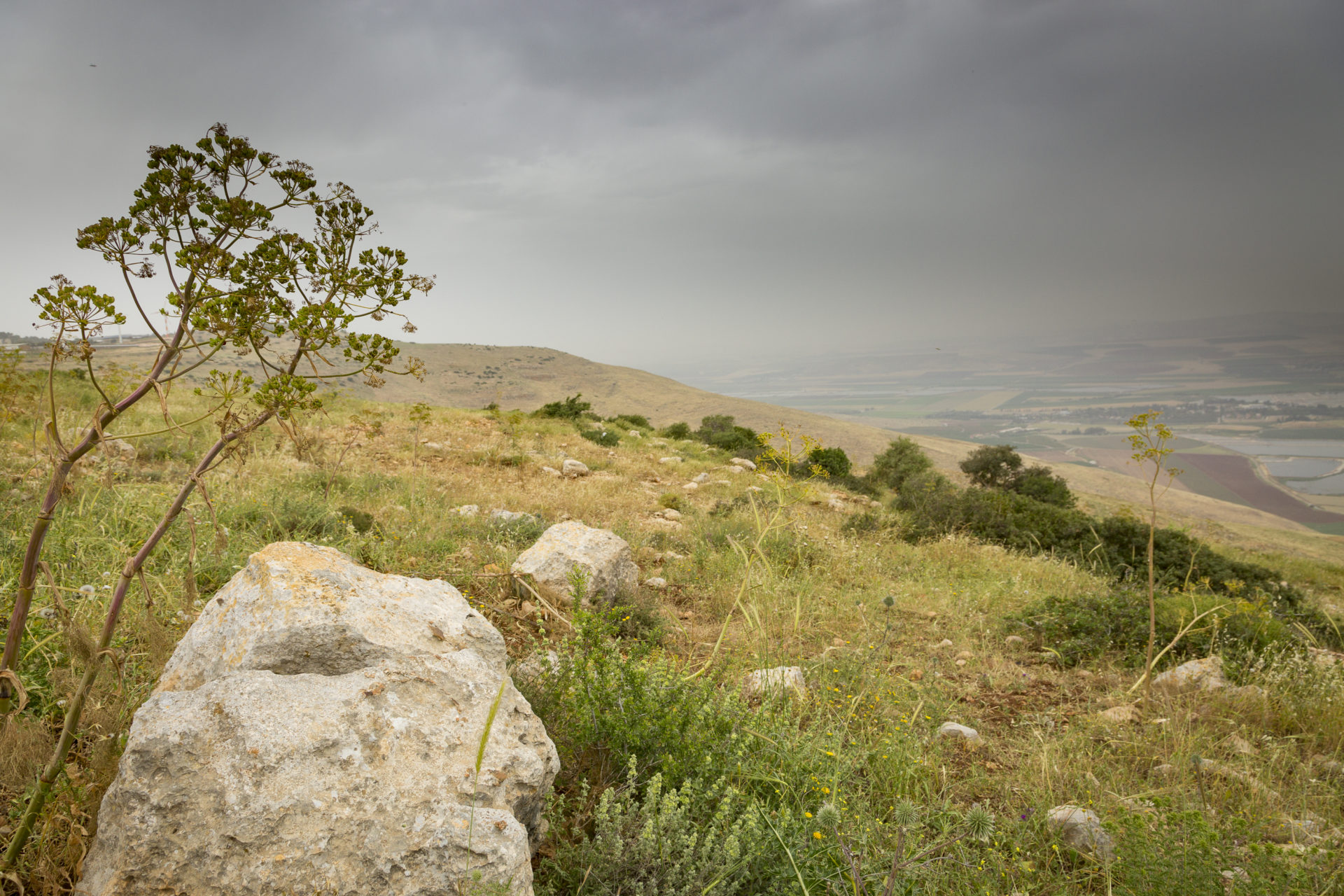 Listen, this is the message I want to underline in your heart and mind.
Listen, this is the message I want to underline in your heart and mind.
- Any part of your old life that you spare will come back and slay you and take your crown.
- Any part of our flesh (like Agag) that we spare will come back with a vengeance and slay us.
- Amalekites (the flesh) always come to strike us down when we are weakest – and then rob us of our crown.
Col 3
Romans 13.14
1st Cor 3.13-15
1st Cor 9.24-27
What would make a God of infinite love mete out such a severe judgment? The Amalekites were an ancient nomadic race, descendants of Esau (Gen. 36:12). They inhabited the southern part of Canaan and were perennial enemies of the Israelites. They were the same tribe that viciously attacked Israel at Rephidim shortly after the Exodus, in the famous battle when Aaron and Hur had to support Moses’ arms (Exod. 17:8–13). They ambushed Israel from behind, massacring the stragglers who were most weary (Deut. 25:18). It was a cowardly attack by the most powerful and savage tribe in the whole region. God supernaturally delivered Israel that day, and the Amalekites fled into hiding. At the conclusion of that skirmish, God swore to Moses, “I will utterly blot out the memory of Amalek from under heaven” (v. 14). He actually made it a point of the Mosaic law that Israel was to destroy Amalek:
“Remember what Amalek did to you along the way when you came out from Egypt, how he met you along the way and attacked among you all the stragglers at your rear when you were faint and weary; and he did not fear God. Therefore it shall come about when the Lord your God has given you rest from all your surrounding enemies, in the land which the Lord your God gives you as an inheritance to possess, you shall blot out the memory of Amalek from under heaven; you must not forget” (Deut. 25:17–19, emphasis added).
The Amalekites were fearful warriors. Their intimidating presence was one of the reasons the Israelites disobeyed God and balked at entering the Promised Land at Kadesh-barnea (Num. 13:29).
God’s anger burned against the Amalekites for their wickedness. He constrained even the corrupt prophet Balaam to prophecy their doom: “Amalek was the first of the nations, but his end shall be destruction” (Num. 24:20). The Amalekites used to harass Israel by coming into the land after crops had been sown and moving through the farmland with their tents and livestock, razing everything in their path (Judg. 6:3–5). They hated God, detested Israel, and seemed to delight in wicked and destructive acts.
God’s instructions to Saul, therefore, fulfilled the vow He swore to Moses. Saul was to wipe out the tribe forever. He and his armies were the instrument through which a righteous God would carry out His holy judgment on a sinister people.[3]
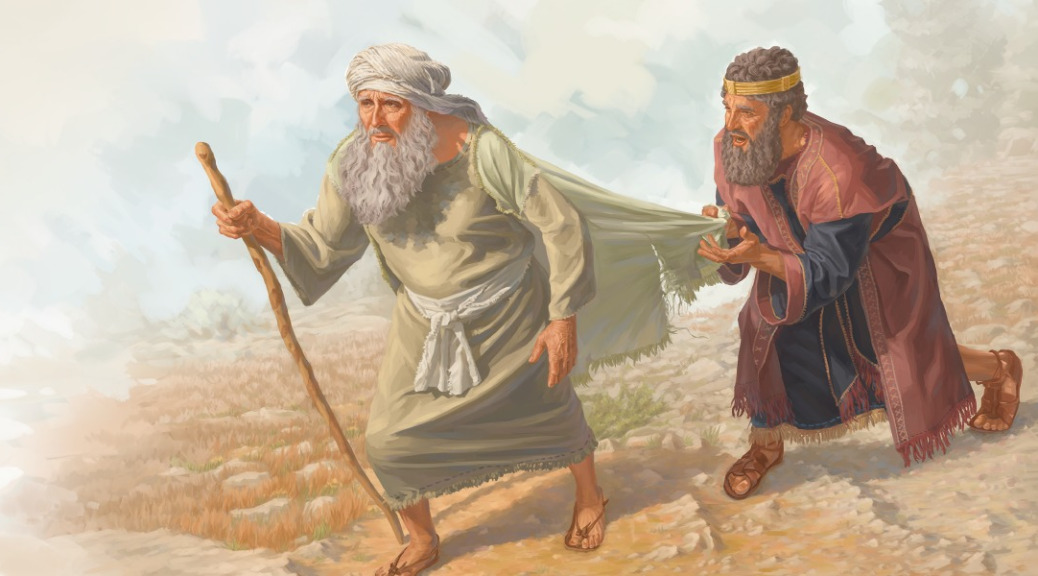 The Consequences of DisobedienceSaul’s Failure to Fulfill God’s Calling
The Consequences of DisobedienceSaul’s Failure to Fulfill God’s Calling
Early in the Israelites’ history, what did God command the Israelites to do? (Read Deuteronomy 25:17-19). Suggested Response: To kill all the Amalekites.
Years later, whom did God choose to destroy the Amalekites? (Read 1 Samuel 15:1-3). Suggested Response: Saul. What did Saul do to the Amalekites? (Read 1 Samuel 15:7-10.) Suggested Responses: He destroyed the Amalekite people but disobeyed God by allowing King Agag and the best animals to live.
About 400 years later, what did Hamana descendant of Agagplan to do to all the Jews? (Read Esther 3:1-11.) If Haman had done this, what would have happened to God’s plan of salvation? Suggested Responses: Haman received permission from King Xerxes to destroy all the Jews and even agreed to pay the murderers for the deed. If this had occurred, God’s plan of salvation through Jesus would have been thwarted.
What is significant about Esther’s family heritage, and how did God use her to save the Jews? (Read 1 Samuel 9:1-2; Esther 2:5-7, 17; 6:1-10; 7:1-7, 9; 9:5-10.) Suggested Responses: Esther who became the queen of King Xerxes was a descendant of Kish, Saul’s father. After King Xerxes learned how Esther’s cousin, Mordecai, had saved his life, Esther was faithful to God and petitioned the king to save the Jews from Haman’s scheme. The king agreed and executed Haman, and the Jews later killed Haman’s sons. So, God gave the family of Saul an opportunity to be faithful and preserve God’s plan from the tragedy Saul had created by not killing King Agag.
17:8 Amalek came and fought. The Amalekites took their name from Amalek, the grandson of Esau, and dwelt as a nomadic people in the Negev. Israel first encountered their military at Rephidim in the wilderness (Ex. 17:8–13; Deut. 25:17, 18). As a result, the Amalekites were doomed to annihilation by God (17:14; Num. 24:20; Deut. 25:19) but it would not be immediate (17:16). The Amalekites defeated disobedient Israel at Hormah (Num. 14:43–45). Saul failed to destroy them as God ordered (1 Sam. 15:2, 3, 9). David later fought and defeated the Amalekites (1 Sam. 30:1–20). In Hezekiah’s day, the Amalekite remnant in the land was finally destroyed by Hezekiah (ca. 716–687 b.c.). The final descendants of Agag (Esth. 3:1), the Amalekite king in Saul’s day, were destroyed in Persia at the time of Esther and Mordecai (ca. 473 b.c.; Esth. 2:5, 8–10).[4]
AMALEKITES
The descendants of Amalek, the firstborn of Esau (Gen. 36:12), who dwelt S of Palestine in the Negev.[5]
The historical genesis for the drama played out between Mordecai (a Benjamite descendant of Saul—2:5) and Haman (an Agagite—3:1, 10; 8:3, 5; 9:24) goes back almost 1,000 years when the Jews exited from Egypt (ca. 1445 b.c.) and were attacked by the Amalekites (Ex. 17:8–16), whose lineage began with Amalek, son of Esau (Gen. 36:12). God pronounced His curse on the Amalekites, which resulted in their total elimination as a people (Ex. 17:14; Deut. 25:17–19). Although Saul (ca. 1030 b.c.) received orders to kill all the Amalekites, including their king Agag (1 Sam. 15:2, 3), he disobeyed (1 Sam. 15:7–9) and incurred God’s displeasure (1 Sam. 15:11, 26; 28:18). Samuel finally hacked Agag into pieces (1 Sam. 15:32, 33). Because of his lineage from Agag, Haman carried deep hostility toward the Jews.
The time of Esther arrived 550 years after the death of Agag, but in spite of such passage of time, neither Haman the Agagite nor Mordecai the Benjamite had forgotten the tribal feud that still smoldered in their souls. This explains why Mordecai refused to bow down to Haman (3:2, 3) and why Haman so viciously attempted to exterminate the Jewish race (3:5, 6, 13). As expected, God’s prophecy to extinguish the Amalekites (Ex. 17:14; Deut. 25:17–19) and God’s promise to preserve the Jews (Gen. 17:1–8) prevailed.[6]
Esau was a picture of the flesh. As Israel could not overcome Amalek by their own efforts, neither can you nor I overcome the flesh by our own efforts. The flesh wars against the spirit and the spirit against the flesh. Paul explains it in Galatians 5:17, “For the flesh lusteth against the Spirit, and the Spirit against the flesh: and these are contrary the one to the other: so that ye cannot do the things that ye would.” This is the picture we have in the wilderness as Israel and Amalek war against each other.[7]
During their wilderness march the Israelites ran into the Amalekites, who represent the flesh in Scripture. This experience is yet another lesson we would do well to learn.
Then came Amalek, and fought with Israel in Rephidim [Exod. 17.8].
Amalek was a descendant of Esau, and the Amalekites had become enemies of Israel. They never ceased to be Israel’s enemies. For the first time the children of Israel engage in warfare.
And Moses said unto Joshua, Choose us out men, and go out, fight with Amalek: tomorrow I will stand on the top of the hill with the rod of God in mine hand.
So Joshua did as Moses had said to him, and fought with Amalek: and Moses, Aaron, and Hur went up to the top of the hill [Exod. 17:9–10].
Esau was a picture of the flesh. As Israel could not overcome Amalek by their own efforts, neither can you nor I overcome the flesh by our own efforts. The flesh wars against the spirit and the spirit against the flesh. Paul explains it in Galatians 5:17, “For the flesh lusteth against the Spirit, and the Spirit against the flesh: and these are contrary the one to the other: so that ye cannot do the things that ye would.” This is the picture we have in the wilderness as Israel and Amalek war against each other.
And it came to pass, when Moses held up his hand, that Israel prevailed: and when he let down his hand, Amalek prevailed.
But Moses’ hands were heavy; and they took a stone, and put it under him, and he sat thereon; and Aaron and Hur stayed up his hands, the one on the one side, and the other on the other side; and his hands were steady until the going down of the sun [Exod. 17:11–12].
Careful observation reveals that the battle was actually fought on top of the mountain. It was fought by prayer. This battle was not won by Israel’s fighting ability because they were not experienced soldiers nor adept at warfare yet. This battle was fought and won by Moses. The moment Moses was no longer able to hold his hands up, the children of Israel began to lose the fight. If it had not been for Moses, Israel would have lost the battle. The important thing to remember is that the Holy Spirit is the only One who can give us victory over the flesh. Victory comes as the believer walks in the Spirit. When you and I act independently of the Spirit, Amalek, or the flesh, wins an easy victory. When Moses’ hands were held up, the Israelites won. You and I never will be able to overcome the flesh. It is only the Spirit of God who can do that.
And Joshua discomfited Amalek and his people with the edge of the sword.
And the Lord said unto Moses, Write this for a memorial in a book, and rehearse it in the ears of Joshua: for I will utterly put out the remembrance of Amalek from under heaven [Exod. 17:13–14].
And Moses built an altar, and called the name of it Jehovah-nissi:
For he said, Because the Lord hath sworn that the Lord will have war with Amalek from generation to generation [Exod. 17:15–16].
 There are three important things to remember. First, God is going to get rid of Amalek. In other words, God is going to get rid of the old nature. Secondly, the Lord will never compromise with the old nature. He will have war with Amalek from generation to generation. The third important item is that this constant conflict will go on as long as we live in this life. The flesh and the spirit will always war against each other. Only the Holy Spirit of God can give us victory. We need to recognize this fact.[8]
There are three important things to remember. First, God is going to get rid of Amalek. In other words, God is going to get rid of the old nature. Secondly, the Lord will never compromise with the old nature. He will have war with Amalek from generation to generation. The third important item is that this constant conflict will go on as long as we live in this life. The flesh and the spirit will always war against each other. Only the Holy Spirit of God can give us victory. We need to recognize this fact.[8]
In Exodus 17 we have the record of Amalek’s attack upon the children of Israel when they came out of Egypt. The Amalekites were marauding nomads out on that desert.
Remember what Amalek did unto thee by the way, when ye were come forth out of Egypt;
How he met thee by the way, and smote the hindmost of thee, even all that were feeble behind thee, when thou wast faint and weary; and he feared not God.
Therefore it shall be, when the Lord thy God hath given thee rest from all thine enemies round about, in the land which the Lord thy God giveth thee for an inheritance to possess it, that thou shalt blot out the remembrance of Amalek from under heaven; thou shalt not forget it [Deut. 25:17–19].
Israel had suffered an unprovoked attack by Amalek at Rephidim. That was the battle when Moses was on the top of the mountain and Aaron and Hur held up his arms in prayer to God. When his hands were up, Joshua and the army of Israel won; when his hands were down, they lost. They finally won a victory over Amalek. At that time the Lord said a very interesting thing, “… thou shalt blot out the remembrance of Amalek from under heaven.”
As I have mentioned before, Amalek represents the flesh; that is, the fallen nature we inherited from Adam. God intends eventually to get rid of that old nature—it would be impossible to go to heaven with it. You and I have an old nature that can never be obedient unto God. We will deal with this subject quite thoroughly when we get to the Epistle to the Romans. Amalek is an illustration of the flesh. As long as we are in this life, we shall never get rid of the flesh—“Because the Lord hath sworn that the Lord will have war with Amalek from generation to generation” (Exod. 17:16). We saw in chapter 23 that the flesh is not for us to despise. We cannot overcome the flesh by becoming ascetic or by trying to beat it down or by becoming super pious. That won’t accomplish anything. But we do need to recognize that there is a war going on in each one of us. It is a war between the spirit and the flesh.
“For the flesh lusteth against the Spirit, and the Spirit against the flesh: and these are contrary the one to the other: so that ye cannot do the things that ye would” (Gal. 5:17). We cannot overcome the flesh by fighting. The only way we can overcome the flesh is by yielding to the Spirit of God. Only the Spirit of God can produce the fruits of the Spirit in our lives. The Lord says that He is going to blot out the remembrances of Amalek from under heaven. I thank God that He intends to get rid of the flesh someday![9]
The sword of the Spirit (v. 17b). This sword is the offensive weapon God provides us. The Roman soldier wore on his girdle a short sword which was used for close-in fighting. Hebrews 4:12 compares the Word of God to a sword, because it is sharp and is able to pierce the inner man just as a material sword pierces the body. You and I were “cut to the heart” (Acts 2:37; 5:33) when the Word convicted us of our sins. Peter tried to use a sword to defend Jesus in the Garden (Luke 22:47–51); but he learned at Pentecost that the “sword of the Spirit” does a much better job. Moses also tried to conquer with a physical sword (Ex. 2:11–15), only to discover that God’s Word alone was more than enough to defeat Egypt.
A material sword pierces the body, but the Word of God pierces the heart. The more you use a physical sword, the duller it becomes; but using God’s Word only makes it sharper in our lives. A physical sword requires the hand of a soldier, but the sword of the Spirit has its own power, for it is “living and powerful” (Heb. 4:12). The Spirit wrote the Word, and the Spirit wields the Word as we take it by faith and use it. A physical sword wounds to hurt and kill, while the sword of the Spirit wounds to heal and give life. But when we use the sword against Satan, we are out to deal him a blow that will cripple him and keep him from hindering God’s work.
When He was tempted by Satan in the wilderness, Christ used the sword of the Spirit and defeated the enemy. Three times Jesus said, “It is written” (Luke 4:1–13). Note that Satan can also quote the Word: “For it is written” (Luke 4:10), but he does not quote it completely. Satan tries to use the Word of God to confuse us, so it is important that we know every word that God has given us. “You can prove anything by the Bible,” someone said. True—if you take verses out of context, leave out words, and apply verses to Christians today that do not really apply. The better you know the Word of God, the easier it will be for you to detect Satan’s lies and reject his offers.
In one sense, the “whole armor of God” is a picture of Jesus Christ. Christ is the Truth (John 14:6), and He is our righteousness (2 Cor. 5:21) and our peace (Eph. 2:14). His faithfulness makes possible our faith (Gal. 2:20); He is our salvation (Luke 2:30); and He is the Word of God (John 1:1, 14). This means that when we trusted Christ, we received the armor. Paul told the Romans what to do with the armor (Rom. 13:11–14): wake up (Rom. 13:11), cast off sin, and “put on the armor of light” (Rom. 13:12). We do this by putting “on the Lord Jesus Christ” (Rom. 13:14). By faith, put on the armor and trust God for the victory. Once and for all, we have put on the armor at the moment of salvation. But there must be a daily appropriation. When King David put off his armor and returned to his palace, he was in greater danger than when he was on the battlefield (2 Sam. 11). We are never out of reach of Satan’s devices, so we must never be without the whole armor of God.
 LAST PIECE OF ARMOR IS PRAYER!
LAST PIECE OF ARMOR IS PRAYER!
The Energy (Eph. 6:18–20)
Prayer is the energy that enables the Christian soldier to wear the armor and wield the sword. We cannot fight the battle in our own power, no matter how strong or talented we may think we are. When Amalek attacked Israel, Moses went to the mountaintop to pray, while Joshua used the sword down in the valley (Ex. 17:8–16). It took both to defeat Amalek—Moses’ intercession on the mountain, and Joshua’s use of the sword in the valley. Prayer is the power for victory, but not just any kind of prayer. Paul tells how to pray if we would defeat Satan.
Pray always. This obviously does not mean “always saying prayers.” We are not heard for our “much speaking” (Matt. 6:7). “Pray without ceasing” (1 Thes. 5:17) says to us, “Always be in communion with the Lord. Keep the receiver off the hook!” Never have to say when you pray, “Lord, we come into Thy presence,” because you never left His presence! A Christian must “pray always” because he is always subject to temptations and attacks of the devil. A surprise attack has defeated more than one believer who forgot to “pray without ceasing.” CALLED FROM PARKING LOT AT NIGHT.
Pray with all prayer. There is more than one kind of praying: prayer, supplication, intercession, thanksgiving (Phil. 4:6; 1 Tim. 2:1). The believer who prays only to ask for things is missing out on blessings that come with intercessions and giving of thanks. In fact, thanksgiving is a great prayer weapon for defeating Satan. “Praise changes things” as much as “prayer changes things.” Intercession for others can bring victory to our own lives. “And the Lord turned the captivity of Job when he prayed for his friends” (Job 42:10).
Pray in the Spirit. The Bible formula is that we pray to the Father, through the Son, and in the Spirit. Romans 8:26–27 tells us that only in the Spirit’s power can we pray in the will of God. Otherwise, our praying could be selfish and out of the will of God. In the Old Testament tabernacle, there was a small golden altar standing before the veil, and here the priest burned the incense (Ex. 30:1–10; Luke 1:1–11). The incense is a picture of prayer. It had to be mixed according to God’s plan and could not be counterfeited by man. The fire on the altar is a picture of the Holy Spirit, for it is He who takes our prayers and “ignites” them in the will of God. It is possible to pray fervently in the flesh and never get through to God. It is also possible to pray quietly in the Spirit and see God’s hand do great things.
Pray with your eyes open. Watching means “keeping on the alert.” The phrase “watch and pray” occurs often in the Bible. When Nehemiah was repairing the walls of Jerusalem, and the enemy was trying to stop the work, Nehemiah defeated the enemy by watching and praying. “Nevertheless we made our prayer unto our God, and set a watch” (Neh. 4:9). “Watch and pray” is the secret of victory over the world (Mark 13:33), the flesh (Mark 14:38), and the devil (Eph. 6:18). Peter went to sleep when he should have been praying, and the result was victory for Satan (Mark 14:29–31, 67–72). God expects us to use our God-given senses, led by the Spirit, so that we detect Satan when he is beginning to work.
Keep on praying. The word perseverance simply means “to stick to it and not quit.” The early believers prayed this way (Acts 1:14; 2:42; 6:4); and we also should pray this way (Rom. 12:12). Perseverance in prayer does not mean we are trying to twist God’s arm, but rather that we are deeply concerned and burdened and cannot rest until we get God’s answer. As Robert Law puts it, “Prayer is not getting man’s will done in heaven; it is getting God’s will done on earth” (Tests of Life, [Grand Rapids: Baker, 1968]). Most of us quit praying just before God is about to give the victory. Not everybody is so constituted that he can sincerely spend a whole night in prayer, but all of us can persevere in prayer far more than we do. The early church prayed without ceasing when Peter was in prison and, at the last moment, God gave them their answer (Acts 12:1–19). Keep on praying until the Spirit stops you or the Father answers you. Just about the time you feel like quitting, God will give the answer.
Pray for all the saints. The Lord’s Prayer begins with “Our Father”—not “My Father.” We pray as part of a great family that is also talking to God, and we ought to pray for the other members of the family. Even Paul asked for the prayer support of the Ephesians—and he had been to the third heaven and back. If Paul needed the prayers of the saints, how much more do you and I need them! If my prayers help another believer defeat Satan, then that victory will help me too. Note that Paul did not ask them to pray for his comfort or safety, but for the effectiveness of his witness and ministry.[10]
Judgment of Amalek
In Exodus 17 we have the record of Amalek’s attack upon the children of Israel when they came out of Egypt. The Amalekites were marauding nomads out on that desert.
Remember what Amalek did unto thee by the way, when ye were come forth out of Egypt;
How he met thee by the way, and smote the hindmost of thee, even all that were feeble behind thee, when thou wast faint and weary; and he feared not God.
Therefore it shall be, when the Lord thy God hath given thee rest from all thine enemies round about, in the land which the Lord thy God giveth thee for an inheritance to possess it, that thou shalt blot out the remembrance of Amalek from under heaven; thou shalt not forget it [Deut. 25:17–19].
As I have mentioned before, Amalek represents the flesh; that is, the fallen nature we inherited from Adam. God intends eventually to get rid of that old nature—it would be impossible to go to heaven with it. You and I have an old nature that can never be obedient unto God. We will deal with this subject quite thoroughly when we get to the Epistle to the Romans. Amalek is an illustration of the flesh. As long as we are in this life, we shall never get rid of the flesh—“Because the Lord hath sworn that the Lord will have war with Amalek from generation to generation” (Exod. 17:16). [11]
The historical genesis for the drama played out between Mordecai (a Benjamite descendant of Saul—2:5) and Haman (an Agagite—3:1, 10; 8:3, 5; 9:24) goes back almost 1,000 years when the Jews exited from Egypt (ca. 1445 b.c.) and were attacked by the Amalekites (Ex. 17:8–16), whose lineage began with Amalek, son of Esau (Gen. 36:12). God pronounced His curse on the Amalekites, which resulted in their total elimination as a people (Ex. 17:14; Deut. 25:17–19). Although Saul (ca. 1030 b.c.) received orders to kill all the Amalekites, including their king Agag (1 Sam. 15:2, 3), he disobeyed (1 Sam. 15:7–9) and incurred God’s displeasure (1 Sam. 15:11, 26; 28:18). Samuel finally hacked Agag into pieces (1 Sam. 15:32, 33). Because of his lineage from Agag, Haman carried deep hostility toward the Jews.
The time of Esther arrived 550 years after the death of Agag, but in spite of such passage of time, neither Haman the Agagite nor Mordecai the Benjamite had forgotten the tribal feud that still smoldered in their souls. This explains why Mordecai refused to bow down to Haman (3:2, 3) and why Haman so viciously attempted to exterminate the Jewish race (3:5, 6, 13). As expected, God’s prophecy to extinguish the Amalekites (Ex. 17:14; Deut. 25:17–19) and God’s promise to preserve the Jews (Gen. 17:1–8) prevailed.
 Esther could be compared to a chess game. God and Satan (as invisible players) moved real kings, queens, and nobles. When Satan put Haman into place, it was as if he announced “Check.” God then positioned Esther and Mordecai in order to put Satan into “Checkmate!” Ever since the fall of man (Gen. 3:1–19), Satan has attempted to spiritually sever God’s relationship with His human creation and disrupt God’s covenant promises with Israel. For example, Christ’s line through the tribe of Judah had been murderously reduced to Joash alone, who was rescued and preserved (2 Chr. 22:10–12). Later, Herod slaughtered the infants of Bethlehem, thinking Christ was among them (Matt. 2:16). Satan tempted Christ to denounce God and worship him (Matt. 4:9). Peter, at Satan’s insistence, tried to block Christ’s journey to Calvary (Matt. 16:22). Finally, Satan entered into Judas who then betrayed Christ to the Jews and Romans (Luke 22:3–6). While God was not mentioned in Esther, He was everywhere apparent as the One who opposed and foiled Satan’s diabolical schemes by providential intervention.
Esther could be compared to a chess game. God and Satan (as invisible players) moved real kings, queens, and nobles. When Satan put Haman into place, it was as if he announced “Check.” God then positioned Esther and Mordecai in order to put Satan into “Checkmate!” Ever since the fall of man (Gen. 3:1–19), Satan has attempted to spiritually sever God’s relationship with His human creation and disrupt God’s covenant promises with Israel. For example, Christ’s line through the tribe of Judah had been murderously reduced to Joash alone, who was rescued and preserved (2 Chr. 22:10–12). Later, Herod slaughtered the infants of Bethlehem, thinking Christ was among them (Matt. 2:16). Satan tempted Christ to denounce God and worship him (Matt. 4:9). Peter, at Satan’s insistence, tried to block Christ’s journey to Calvary (Matt. 16:22). Finally, Satan entered into Judas who then betrayed Christ to the Jews and Romans (Luke 22:3–6). While God was not mentioned in Esther, He was everywhere apparent as the One who opposed and foiled Satan’s diabolical schemes by providential intervention.
In Esther, all of God’s unconditional covenant promises to Abraham (Gen. 17:1–8) and to David (2 Sam. 7:8–16) were jeopardized. However, God’s love for Israel is nowhere more apparent than in this dramatic rescue of His people from pending elimination. “Behold, He who keeps Israel shall neither slumber nor sleep” (Ps. 121:4).[12]
The pattern of a true believer’s life, on the other hand, will show that he not only professes Christ but that he lives his life by Christ’s Spirit and is habitually putting to death the sinful and ungodly deeds of the body. Consequently, he will live, that is, possess and persevere to the fulness of eternal life given him in Christ.
When God ordered King Saul to destroy all of the Amalekites and their livestock, Saul did not completely obey, sparing king Agag and keeping the best of the animals. When the prophet Samuel confronted Saul, the king tried to defend his actions by claiming his people insisted on keeping some of the flocks and that those animals would be sacrificed to God. Samuel rebuked the king, saying, “Has the Lord as much delight in burnt offerings and sacrifices as in obeying the voice of the Lord? Behold, to obey is better than sacrifice, and to heed than the fat of rams” (1 Sam. 15:22). Despite the king’s pleas for mercy, Samuel then proclaimed, “The Lord has torn the kingdom of Israel from you today, and has given it to your neighbor [David] who is better than you” (v. 28). Saul’s failure to fully obey God cost him his throne.
God’s people invariably fall back into sin when their focus turns away from the Almighty to themselves and to the things of the world. For that reason Paul admonished the believers at Colossae, “If then you have been raised up with Christ, keep seeking the things above, where Christ is, seated at the right hand of God. Set your mind on the things above, not on the things that are on earth. For you have died and your life is hidden with Christ in God” (Col. 3:1-3). He then gave a partial but representative list of sins that Christians should kill by considering themselves dead to: “immorality, impurity, passion, evil desire, and greed, which amounts to idolatry. For it is on account of these things that the wrath of God will come, and in them you also once walked, when you were living in them. But now you also, put them all aside: anger, wrath, malice, slander, and abusive speech from your mouth. Do not lie to one another, since you laid aside the old self with its evil practices, and have put on the new self who is being renewed to a true knowledge according to the image of the One who created him” (vv. 5-10).
Scripture offers believers many helps for avoiding and killing sin in their lives. First, it is imperative to recognize the presence of sin in our flesh. We must be willing to confess honestly with Paul, “I find then the principle that evil is present in me, the one who wishes to do good” (Rom. 7:21). If we do not admit to sin, we delude ourselves and become still more susceptible to its influence. Sin can become a powerful and destructive force in a believer’s life if it is not recognized and put to death. Our remaining humanness is constantly ready to drag us back into the sinful ways of our life before Christ. Knowing that truth well, Peter admonishes, “Beloved, I urge you as aliens and strangers to abstain from fleshly lusts, which wage war against the soul” (1 Pet. 2:11). If Christians did not live in constant danger from sin, such advice would be pointless.
Because of the influence of our human weaknesses and limitations on our thinking, it is often difficult to recognize sin in our lives. It can easily become camouflaged, often under the guise of something that seems trivial or insignificant, even righteous and good. We must therefore pray with David, “Search me, O God, and know my heart; try me and know my anxious thoughts; and see if there be any hurtful way in me, and lead me in the everlasting way” (Ps. 139:23-24). Haggai’s counsel to ancient Israel is helpful for believers in any age: “Consider your ways!” (Hag. 1:5, 7).
A second way for believers to kill sin in their lives is to have a heart fixed on God. David said to the Lord, “My heart is steadfast, O God, my heart is steadfast; I will sing, yes, I will sing praises!” (Ps. 57:7). Another psalmist testified, “O that my ways may be established to keep Thy statutes! Then I shall not be ashamed when I look upon all Thy commandments” (Ps. 119:5-6). In other words, when we know and obey God’s Word, we are building up both our defenses and offenses against sin.
A third way for believers to kill sin in their lives is to meditate on God’s Word. Many of the Lord’s truths become clear only when we patiently immerse ourselves in a passage of Scripture and give the Lord opportunity to give us deeper understanding. David gives us the example with these words: “Thy word I have treasured in my heart, that I may not sin against Thee” (Ps. 119:11).
A fourth way to destroy sin in our lives is to commune regularly with God in prayer. Peter calls us to “be of sound judgment and sober spirit for the purpose of prayer” (1 Pet. 4:7). When we are faithful in these disciplines we discover how interrelated they are. It is often difficult to tell where study of God’s word ends and meditation on it begins, and where meditation ends and prayer begins.
It should be emphasized that true prayer must always have an element of confession. Although we have the assurance that we belong to God and are free from condemnation, we also know that we can never come before him completely sinless. “If we say that we have no sin, we are deceiving ourselves, and the truth is not in us,” John warns believers. But “if we confess our sins, He is faithful and righteous to forgive us our sins and to cleanse us from all unrighteousness. If we say that we have not sinned, we make Him a liar, and His word is not in us” (1 John 1:8-10). The writer of Hebrews admonishes, “Let us therefore draw near with confidence to the throne of grace, that we may receive mercy and may find grace to help in time of need” (Heb. 4:16). We need to be cleansed every time we come to Him.
Sincere prayer has a way of unmasking sin’s deceit. When God’s children open their minds and hearts to their heavenly Father, He lovingly reveals sins that otherwise would go unnoticed.
 A fifth way to put to death sin in our lives is to practice obedience to God. Doing His will and His will alone in all the small issues of life can be training in habits that will hold up in the severe times of temptations.
A fifth way to put to death sin in our lives is to practice obedience to God. Doing His will and His will alone in all the small issues of life can be training in habits that will hold up in the severe times of temptations.
As Paul has already made plain by the testimony from his own life in chapter 7, putting sin to death is often difficult, slow, and frustrating. Satan is the great adversary of God’s people and will make every effort to drag them down into sin. But as they conquer sin in their lives through the power of the indwelling Holy Spirit, they not only are brought nearer to their heavenly Father but attain every increasing assurance that they are indeed His children and are eternally secure in Him.
Speaking of the believer’s conflict with sin, Paul told the Galatians that “the flesh sets its desire against the Spirit, and the Spirit against the flesh; for these are in opposition to one another, so that you may not do the things that you please” (Gal. 5:17). A few verses later he declares that “those who belong to Christ Jesus have crucified the flesh with its passions and desires. If we live by the Spirit, let us also walk by the Spirit” (vv. 24-25). In other words, because our inner, spiritual lives are indwelt by the Holy Spirit, our behavior should be according to His will and in His power. Through the Holy Spirit who indwells him, every true Christian has the divine resource to have victory over Satan, over the world, and over sin.
In his letter to Ephesus, Paul refers to the believer’s continual need to rely on the Spirit’s power, and he admonishes: “Do not get drunk with wine, for that is dissipation, but be filled with the Spirit” (Eph. 5:18). A more literal translation is, “keep being filled with the Spirit.” The idea is, “Always rely on the power of the Holy Spirit, who resides within you and is always available to strengthen and protect you.” To be filled with the Spirit is to have one’s mind completely under His divine control. This requires the Word’s dwelling richly in the believer (cf. Col. 3:16). And when our minds are under God’s control, our behavior inevitably will be as well. It is not a matter of available power but of available will. By the Spirit’s power, all believers are able “to walk in a manner worthy of the calling with which [they] have been called” (Eph. 4:1). Those who truly “put on the Lord Jesus Christ” will “make no provision for the flesh in regard to its lusts” (Rom. 13:14).
Being controlled by God’s Spirit comes from being obedient to His Word. The Spirit-filled life does not come through mystical or ecstatic experiences but from studying and submitting oneself to Scripture. As a believer faithfully and submissively saturates his mind and heart with God’s truth, his Spirit-controlled behavior will follow as surely as night follows day. When we are filled with God’s truth and led by His Spirit, even our involuntary reactions-those that happen when we don’t have time to consciously decide what to do or say-will be godly.[13]
God’s Anger Against Amalek
An Old Testament illustration may help to shed light on our relationship to sin. In 1 Samuel 15, we read that Samuel anointed Saul and solemnly gave him these instructions from the Lord: “Now go and strike Amalek and utterly destroy all that he has, and do not spare him; but put to death both man and woman, child and infant, ox and sheep, camel and donkey” (v. 3).
God’s command was clear. Saul was to deal ruthlessly with the Amalekites, killing even their infant children and animals. Their whole tribe was to be utterly and mercilessly leveled—no hostages taken.
.
The Folly of Partial Obedience
But Saul’s obedience was only partial. He won a crushing defeat against the Amalekites, routing them “from Havilah as you go to Shur, which is east of Egypt” (1 Sam. 15:7). As commanded, he killed all the people, but “he captured Agag the king of the Amalekites alive” (v. 8). “Saul and the people spared Agag and the best of the sheep, the oxen, the fatlings, the lambs, and all that was good, and were not willing to destroy them utterly; but everything despised and worthless, that they utterly destroyed” (v. 9). In other words, motivated by covetousness, they kept all the best possessions of the Amalekites, collecting the spoils of victory, willfully disobeying the Lord’s instructions.
Why did Saul spare Agag? Perhaps he wanted to use the humiliated king of the Amalekites as a trophy to display his own power. Saul seemed motivated only by pride at this point; he even set up a monument to himself at Carmel (v. 12). Whatever his reasons, he disobeyed the clear command of God and allowed Agag to live.
The sin was so serious that God immediately deposed Saul and his descendants forever from the throne of Israel. Samuel told him, “Because you have rejected the word of the Lord, He has also rejected you from being king” (v. 23).
Then Samuel said, “Bring me Agag, the king of the Amalekites” (v. 32).
Agag, evidently thinking that his life had been spared and feeling pretty confident, “came to him cheerfully.” “Surely the bitterness of death is past,” he said.
But Samuel was not amused. He told Agag, “As your sword has made women childless, so shall your mother be childless among women.” Scripture simply says, “And Samuel hewed Agag to pieces before the Lord at Gilgal” (v. 33).
Our minds instinctively recoil from what seems a merciless act. But it was God who commanded that this be done. This was an act of divine judgment to show the holy wrath of an indignant God against wanton sin. Unlike his countrymen and their king, Samuel was determined to carry out the Lord’s command entirely. As it was, the battle that was supposed to exterminate the Amalekites forever ended before the goal was accomplished. Scripture records that only a few years later, the reinvigorated tribe raided the southern territory and took all the women and children captive—including David’s family (1 Sam. 30:1–5).
When David found the marauding Amalekites, “Behold, they were spread over all the land, eating and drinking and dancing because of all the great spoil that they had taken from the land of the Philistines and from the land of Judah” (v. 16). He slaughtered them from twilight until the next evening, killing all but four hundred who escaped on camels (v. 17).
The Amalekites make an apt illustration of the sin that remains in the believer’s life. That sin—already utterly defeated —must be dealt with ruthlessly and hacked to pieces, or it will revive and continue to plunder and pillage our hearts and sap our spiritual strength. We cannot be merciful with Agag, or he will turn and try to devour us. In fact, the remaining sin in us often becomes more fiercely determined after it has been overthrown by the gospel.
That sin—already utterly defeated—must be dealt with ruthlessly and hacked to pieces, or it will revive and continue to plunder and pillage our hearts and sap our spiritual strength.
Scripture commands us to deal with our sin by putting it to death: “Mortify therefore your members which are upon the earth; fornication, uncleanness, inordinate affection, evil concupiscence, and covetousness, which is idolatry: for which things’ sake the wrath of God cometh on the children of disobedience” (Col. 3:5–6, KJV). We cannot obey partially or halfheartedly as we seek to eliminate sin from our lives. We cannot stop while the task remains incomplete. Sins, like Amalekites, have a way of escaping the slaughter, breeding, reviving, regrouping, and launching new and unexpected assaults on our most vulnerable areas.
In Romans 8:13 Paul also wrote of “putting to death the deeds of the body.” After declaring victory over sin in Romans 6, then describing the ongoing struggle with sin in chapter 7, he describes the triumphant experience of life in the Spirit throughout chapter 8. In the midst of that chapter, the apostle declares that the distinctive behavior of those who are led by the Spirit is that they continually put their evil deeds to death.
It is significant that the Holy Spirit is mentioned only once in the introduction to the epistle (1:4, “the spirit of holiness”), then not mentioned again until Romans 8:1. In Romans 8 alone there are at least twenty references to the Holy Spirit.
Romans 8 portrays the Holy Spirit as the divine agent who frees us from sin and death (vv. 2–3), enables us to live righteously (4–13), assures and comforts us in our affliction (14–19), preserves and sustains us in Christ (20–28), and guarantees our final victory in eternal glory (29–39). Right in the context of this profound teaching about the Holy Spirit’s role in the Christian’s life, Paul has some important things to say about mortifying sin. He begins by contrasting life in the Spirit with life in the flesh and under the law. It is important to understand these truths in their proper context:
What the Law could not do, weak as it was through the flesh, God did: sending His own Son in the likeness of sinful flesh and as an offering for sin, He condemned sin in the flesh, in order that the requirement of the Law might be fulfilled in us, who do not walk according to the flesh, but according to the Spirit. Those who are according to the flesh set their minds on the things of the flesh, but those who are according to the Spirit, the things of the Spirit. For the mind set on the flesh is death, but the mind set on the Spirit is life and peace, because the mind set on the flesh is hostile toward God; for it does not subject itself to the law of God, for it is not even able to do so; and those who are in the flesh cannot please God. However, you are not in the flesh but in the Spirit, if indeed the Spirit of God dwells in you. But if anyone does not have the Spirit of Christ, he does not belong to Him. And if Christ is in you, though the body is dead because of sin, yet the spirit is alive because of righteousness. But if the Spirit of Him who raised Jesus from the dead dwells in you, He who raised Christ Jesus from the dead will also give life to your mortal bodies through His Spirit who indwells you (vv. 3–11, emphasis added).
What Paul is suggesting is that the Holy Spirit changes our basic disposition when we are born again. He brings us into accord with Himself. He actually indwells us (vv. 9, 11). We become partakers of the divine nature (2 Pet. 1:4). Our orientation to God changes. Where there was enmity, there is now love (cf. Rom. 8:28). In the flesh we could not please God (v. 8) but now the righteous requirement of the law is fulfilled in us (v. 4). Central to all of this is the reality that our whole mind-set is new. Whereas the mind set on the flesh meant death, the mind set on the things of the Spirit results in life and peace (v. 6).
If your mind-set—the fundamental orientation of your understanding, its bent, its dispositions, its thought patterns—did not change when you made a profession of faith in Christ, something is seriously wrong. That is not to suggest that Christians cannot fall into old patterns and habits. But it does mean that our thoughts toward God, sin, and righteousness are radically different now that we are “in the Spirit” from when we were “in the flesh.” We have new holy affections and longings for godliness. We have a love for God that transcends our attachment to this world (Jas. 4:4). We can no longer blithely “indulge the flesh in its corrupt desires” (2 Pet. 2:10). We no longer have anything in common with those “who set their minds on earthly things. For our citizenship is in heaven” (Phil. 3:19–20). And it is toward heaven that our minds are now inclined. We set our minds on the things of the Spirit (Rom. 8:5). Even when we fail or fall to earthly temptations, we “joyfully concur with the law of God in the inner man” (7:22). That is our basic orientation and mind set.
Every honest Christian will testify that the tendency to sin is not erased by becoming a believer. We still derive pleasure from sin. We still struggle with sinful habits. Some of those habits are so deeply ingrained that we still battle them after years of spiritual warfare against them. We fall into appalling, shameful sins. The truth is, we sin daily. Our thoughts are not what they ought to be. Our time is often wasted on frivolous and worldly pursuits. From time to time our hearts grow cold to the things of God. Why does all this happen if sin’s dominion is broken?
Paul is describing a way of life where we seek to throttle sin and crush it from our lives, sapping it of its strength, rooting it out, and depriving it of its influence. That is what it means to mortify sin.
How Do We Mortify Sin?
Mortification involves the cultivation of new habits of godliness, combined with the elimination of old sinful habits from our behavior. It is a constant warfare that takes place within the believer. Although we should expect our triumph over sin to be ever-increasing, our mortification can never be wholly complete before we are glorified. We are to remain perpetually committed to the task. We must see sin as a sworn enemy, and commit ourselves to slaying it wherever and whenever it rears its head.
The instrument of mortification is the Holy Spirit, and His power is the energy that works in us to carry out the process. All the means of mortification are simple commands of Scripture that we are to obey. Some of the key commands are highlighted below:
STOP Abstain from fleshly lusts. Peter wrote, “Beloved, I urge you as aliens and strangers to abstain from fleshly lusts, which wage war against the soul” (1 Pet. 2:11). In other words, stop lusting. Abstain from it. Stay away from it. “Flee immorality” (1 Cor. 6:18). What could be more direct?
Do you want to put to death the lusts in your heart? Then stop entertaining them. Peter does not prescribe a program of therapy. He does not suggest that such sin be treated as an addiction. He simply says abstain. Quit doing it. You have no business indulging such thoughts. Put them away at once. You yourself must do this; it cannot be done for you. There is no point waiting for some heavenly power to erase this sin automatically from your life. You are to stop it, and stop it immediately. Martyn Lloyd-Jones said,
I do not know of a single scripture—and I speak advisedly—which tells me to take my sin, the particular thing that gets me down, to God in prayer and ask him to deliver me from it and then trust in faith that he will.
Now that teaching is also often put like this: you must say to a man who is constantly defeated by a particular sin, “I think your only hope is to take it to Christ and Christ will take it from you.” But what does Scripture say in Ephesians 4:28 to the man who finds himself constantly guilty of stealing, to a man who sees something he likes and takes it? What am I to tell such a man? Am I to say, “Take that sin to Christ and ask him to deliver you?” No, what the apostle Paul tells him is this: “Let him that stole, steal no more.” Just that. Stop doing it. And if it is fornication or adultery or lustful thoughts, again: Stop doing it, says Paul. He does not say, “Go and pray to Christ to deliver you.” No. You stop doing that, he says, as becomes children of God.
Here is perhaps the most straightforward, obvious means of mortifying our sin: stop doing it. Too many people think they must wait for an extraordinary experience, a miracle from heaven, a sign from the Lord, or whatever. They think some special divine intervention is necessary to free them from a sinful practice or pattern of thinking. No, that is precisely the error Romans 6 refutes. You are free from sin; now stop doing it. You are dead to sin; now put to death the sin that remains. How? “Abstain.” Reckon yourself dead to sin, and don’t do it anymore. “Resist the devil and he will flee from you” (Jas. 4:7). It is as simple as that.
 STARVE Make no provision for the flesh.
STARVE Make no provision for the flesh.
- In Romans 13:14 Paul writes, “Put on the Lord Jesus Christ, and make no provision for the flesh in regard to its lusts.” In other words, simply refuse to accommodate fleshly lusts. If you struggle with gluttony, don’t load up on junk food when you shop at the market. If you are tempted with sexual desire, don’t fill your mind with images that feed your lust. If you don’t want to fall, don’t walk where it is slippery. Refuse to furnish your mind with the means to entertain evil thoughts. Make no preparations for the possibility of sin. Thus you can slay sin before it breeds.
STARE Fix your heart on Christ. The apostle John wrote, “We know that, when He appears, we shall be like Him, because we shall see Him just as He is. And everyone who has this hope fixed on Him purifies himself, just as He is pure” (1 Jn. 3:2–3). It is an inexorable spiritual law that you become like the object of your worship. Psalm 135 says,
The idols of the nations are but silver and gold, the work of man’s hands. They have mouths, but they do not speak; they have eyes, but they do not see; they have ears, but they do not hear; nor is there any breath at all in their mouths. Those who make them will be like them, yes, everyone who trusts in them. (vv. 15–18, emphasis added).
If the heathen become like the lifeless gods they worship, how much more will we be made like Christ, who have the Holy Spirit in us working to accomplish that very goal? As we fix our hearts on Christ, we discover our worship has the effect of conforming us to His image: “But we all, with unveiled face beholding as in a mirror the glory of the Lord, are being transformed into the same image from glory to glory, just as from the Lord, the Spirit” (2 Cor. 3:18).
Meditate on God’s Word. The psalmist wrote, “Thy word I have treasured in my heart, that I may not sin against Thee” (Ps. 119:11). The Lord told Joshua, “This book of the law shall not depart from your mouth, but you shall meditate on it day and night, so that you may be careful to do according to all that is written in it; for then you will make your way prosperous, and then you will have success” (Josh. 1:8). Do you want to have success in the battle against sin? Familiarize yourself with the Word of God. Meditate on it “day and night” (cf. Ps. 1:2). Let it be a lamp to your feet and a light to your path (Ps. 119:105). As the truth begins to penetrate your heart and mind, it will confront and attack sin.
Jesus prayed, “Sanctify them in the truth; thy word is truth” (Jn. 17:17). The truth of God’s Word is the medium the Holy Spirit uses in our sanctification. Load your mind with it. Fill your heart with it. Ponder it carefully and let it direct your walk. “Whatever is true, whatever is honorable, whatever is right, whatever is pure, whatever is lovely, whatever is of good repute, if there is any excellence and if anything worthy of praise, let your mind dwell on these things” (Phil. 4:8). “Let the word of Christ richly dwell within you” (Col. 3:16). You will discover that “the sword of the Spirit, which is the word of God” (Eph. 6:17) is the most effective weapon for hacking the flesh to pieces.
Pray without ceasing. On the night Jesus was betrayed, He took His disciples with Him to Gethsemane and told them, “Pray that you may not enter into temptation” (Lk. 22:40). Later He found them sleeping and rebuked them for their prayerlessness. He told them, “Keep watching and praying, that you may not enter into temptation; the spirit is willing, but the flesh is weak” (Matt. 26:41).
Prayer must include confession and repentance if it is to be effective in mortifying our sin.
“Lead us not into temptation” was part of the model prayer He gave the disciples (Lk. 11:4). Prayer is an effective and necessary means for heading off sinful temptations before they can attack. Look at prayer as a preemptive strike against fleshliness. By drawing us near to the Lord and focusing our thoughts on Him, prayer both steels us against fleshly temptation, and weakens the temptations when they come.
Watch and pray. Identify the circumstances that lead you into sin, and pray specifically for strength to face those situations. Pray for a holy hatred of sin. Pray that God will show you the real state of your sinful heart. The psalmist prayed this prayer for sanctification:
Who can discern his errors? Acquit me of hidden faults. Also keep back Thy servant from presumptuous sins; let them not rule over me; then I shall be blameless, and I shall be acquitted of great transgression. Let the words of my mouth and the meditation of my heart be acceptable in Thy sight, O Lord, my rock and my Redeemer (Ps. 19:12–14).
Prayer must include confession and repentance if it is to be effective in mortifying our sin. John wrote, “If we confess our sins, He is faithful and righteous to forgive us our sins and to cleanse us from all unrighteousness” (1 Jn. 1:9). And the writer of Hebrews says, “Let us therefore draw near with confidence to the throne of grace, that we may receive mercy and may find grace to help in time of need” (Heb. 4:16).
Exercise self-control. Self-control is a fruit of the Spirit (Gal. 5:23)—and it is also one of the means through which the Spirit enables us to mortify the deeds of the body. Paul wrote,
Everyone who competes in the games exercises self-control in all things. They then do it to receive a perishable wreath, but we an imperishable. Therefore I run in such a way, as not without aim; I box in such a way, as not beating the air; but I buffet my body and make it my slave, lest possibly, after I have preached to others, I myself should be disqualified (1 Cor. 9:25–27).
The word “buffet” in that passage is a translation of the Greek word, meaning “to strike under the eye.” Athletes discipline their bodies for mere earthly prizes. If they are willing to do that, shouldn’t we also be willing to exercise a similar kind of self-control for the heavenly prize?
Paul is not speaking here of punishing the body through self-flagellation or neglect. He certainly is not advocating anything that would physically weaken or injure the body. No athlete would do such things.
I once met a man who wore a belt studded with nails that constantly tore at his flesh. He felt he was punishing his body and atoning for his own sins. Lots of misguided people over the ages have attempted similar means of dealing with the body. Martin Luther almost destroyed his body with excessive fasting as a young monk before he discovered that God’s Word says, “The just shall live by faith” (Rom. 1:17 KJV). In the Philippines at Easter each year, there are men who actually have themselves crucified in a bloody ritual that they believe makes them holy.
That is not at all the spirit of what Scripture calls for. Self-control is a watchful discipline that refuses to pander to the appetites of the body at the soul’s expense. Jesus said, “Be on guard, that your hearts may not be weighted down with dissipation and drunkenness and the worries of life, and [the Day of the Lord] come on you suddenly like a trap” (Lk. 21:34).
 STAY FULL Be filled with the Holy Spirit. “Do not get drunk with wine, for that is dissipation,” Paul wrote, “but be filled with the Spirit” (Eph. 5:18). To be Spirit-filled is to be controlled by the Holy Spirit, just as to be drunk is to be under the influence of alcohol. Believers are to be utterly yielded to the Spirit’s control.
STAY FULL Be filled with the Holy Spirit. “Do not get drunk with wine, for that is dissipation,” Paul wrote, “but be filled with the Spirit” (Eph. 5:18). To be Spirit-filled is to be controlled by the Holy Spirit, just as to be drunk is to be under the influence of alcohol. Believers are to be utterly yielded to the Spirit’s control.
There are many more duties related to mortifying sin—such as clothing oneself with humility (1 Pet. 5:5); having the mind of Christ (Phil. 2:5); putting away spiteful feelings toward others (Eph. 4:31–32); putting on the armor of God (Eph. 6:11–17); laying aside sinful attitudes (Col. 3:8–9); adding the graces of spiritual growth to one’s life (2 Pet. 1:5–7); following the know, reckon, yield, obey, serve pattern of Romans 6 (see Appendix 1)—and many similar responsibilities the New Testament assigns to believers. These may all be subsumed under this basic category of being filled with the Spirit.
It is really as simple as this: “Walk by the Spirit, and you will not carry out the desire of the flesh” (Gal. 5:16). The fruit of the Spirit will overgrow and choke out the works of the flesh.
“Let us [therefore] cleanse ourselves from all defilement of flesh and spirit, perfecting holiness in the fear of God” (2 Cor. 7:1).
Strike Sin at Its Head
John Owen wrote, “He that is appointed to kill an enemy, if he leave striking before the other ceases living, doth but half his work.” We must be always at the task of mortifying sin. We may slaughter a whole tribe of Amalekites, but if we deliberately permit one Agag to escape, God will not be pleased with our efforts.
The flesh is very subtle and deceptive, as we know. A particular sin may leave us alone for awhile to make us think we are rid of it. But it can come back with a hellish fury if we are not on our guard. Sin perpetually stalks us; we must be continually mortifying it. This is a duty we cannot rest from until we rest in glory.
Give sin an inch, it will take a mile. If it can gain a footing in our lives, it will send forth roots and grow like kudzu. It will use us and abuse us and inflict as much disaster as possible. Owen wrote,
Every unclean thought or glance would be adultery if it could; every covetous desire would be oppression, every thought of unbelief would be atheism, might it grow to its head.… It proceeds toward its height by degrees, making good the ground it hath got by hardness.… Now nothing can prevent this but mortification; that withers the root and strikes at the head of sin every hour, so that whatever it aims at it is crossed in. There is not the best saint in the world but, if he should give over this duty, would fall into as many cursed sins as ever did any of his kind. [14]
[1] Abraham was born 2166 BC; Isaac was born 2066 BC; Esau & Jacob were born 2006 BC. Esau married at age 40 in 1966 BC and had a son and then grandson named Amalek. The Exodus was 1446 BC and the attack of Amalek was soon after in Exodus 17.8. From Esau’s marriage to that cowardly attack was about 550 years (1966 BC to 1446 BC = 550 years).
[2] All of this material on 1st Samuel quoted from McGee, J. Vernon, Thru the Bible with J. Vernon McGee, (Nashville: Thomas Nelson Publishers) 2000, c1981.
[3]John F. MacArthur, Jr., The Vanishing Conscience – Drawing the Line in a No-Fault, Guilt-Free World, (Dallas, Texas: Word Publishing) 1997.
[4]John F. MacArthur, Jr., The MacArthur Study Bible, (Dallas: Word Publishing) 1997.
[5]John F. MacArthur, Jr., The MacArthur Study Bible, (Dallas: Word Publishing) 1997.
[6]John F. MacArthur, Jr., The MacArthur Study Bible, (Dallas: Word Publishing) 1997.
[7]McGee, J. Vernon, Thru the Bible with J. Vernon McGee, (Nashville: Thomas Nelson Publishers) 2000, c1981.
[8]McGee, J. Vernon, Thru the Bible with J. Vernon McGee, (Nashville: Thomas Nelson Publishers) 2000, c1981.
[9]McGee, J. Vernon, Thru the Bible with J. Vernon McGee, (Nashville: Thomas Nelson Publishers) 2000, c1981.
[10]Wiersbe, Warren W., The Bible Exposition Commentary, (Wheaton, IL: Victor Books) 1997.
[11]McGee, J. Vernon, Thru the Bible with J. Vernon McGee, (Nashville: Thomas Nelson Publishers) 2000, c1981.
[12]John F. MacArthur, Jr., The MacArthur Study Bible, (Dallas: Word Publishing) 1997.
[13]MacArthur, John F., The MacArthur New Testament Commentary, (Chicago: Moody Press) 1983.
[14]John F. MacArthur, Jr., The Vanishing Conscience – Drawing the Line in a No-Fault, Guilt-Free World, (Dallas, Texas: Word Publishing) 1997.
Slides
Check Out All The Sermons In The Series
You can find all the sermons and short clips from this series, Scriptural Biographies – Peter here.
You can find all the sermons and short clips from this series, Holy Land – Study the Bible in the Land of the Book here.
You can find all the sermons and short clips from this series, The Message Of Jesus here.
You can find all the sermons and short clips from this series, World of The Bible here.
Looking To Study The Bible Like Dr. Barnett?
Dr. Barnett has curated an Amazon page with a large collection of resources he uses in his study of God’s Word. You can check it out here.






